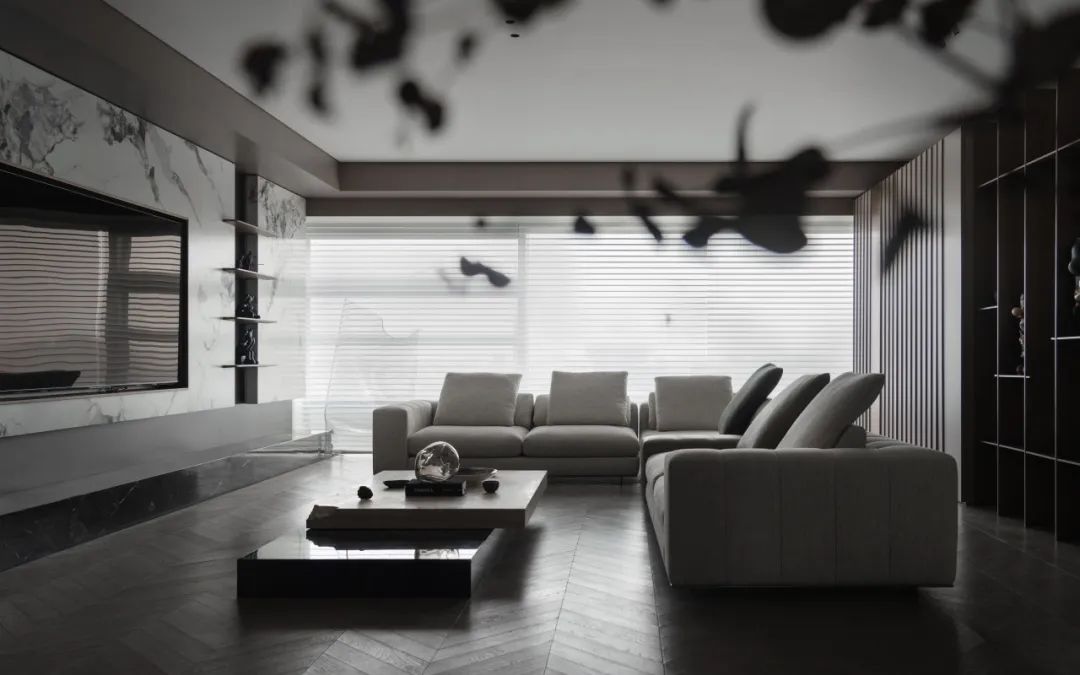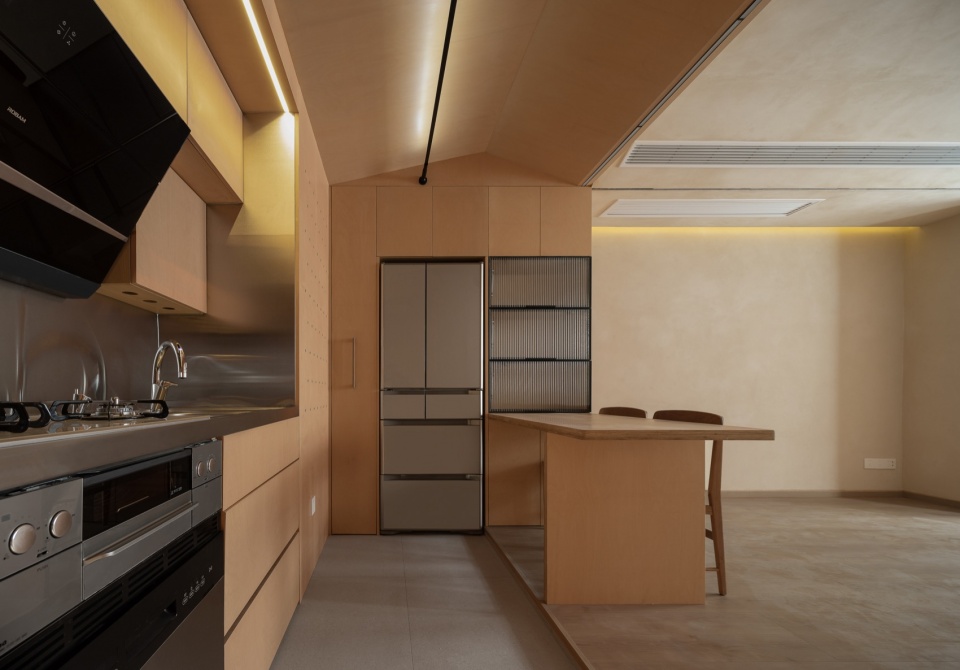

开始FIRE之后,80后彭先生决定带着妻儿回到老家,与父母一同生活。因此,对这处位于启东乡下的老宅进行翻修,变成迫在眉睫的事情。改造后的新彭宅,需要同时容纳两代人迥异的生活习惯,使乡村与城市生活方式在此水乳交融,并且泾渭分明。
After starting FIRE, Mr. Peng, born in the 80s, decided to bring his wife and children back to his hometown to live with his parents. Therefore, the renovation of this old house in the countryside of Qidong became an urgent matter. The new Peng’s residence needed to accommodate the different living habits of the two generations, so that the rural and urban lifestyles could be blended and distinctly separated.
▼嘿,新家,Hey, my new home © 朱清言
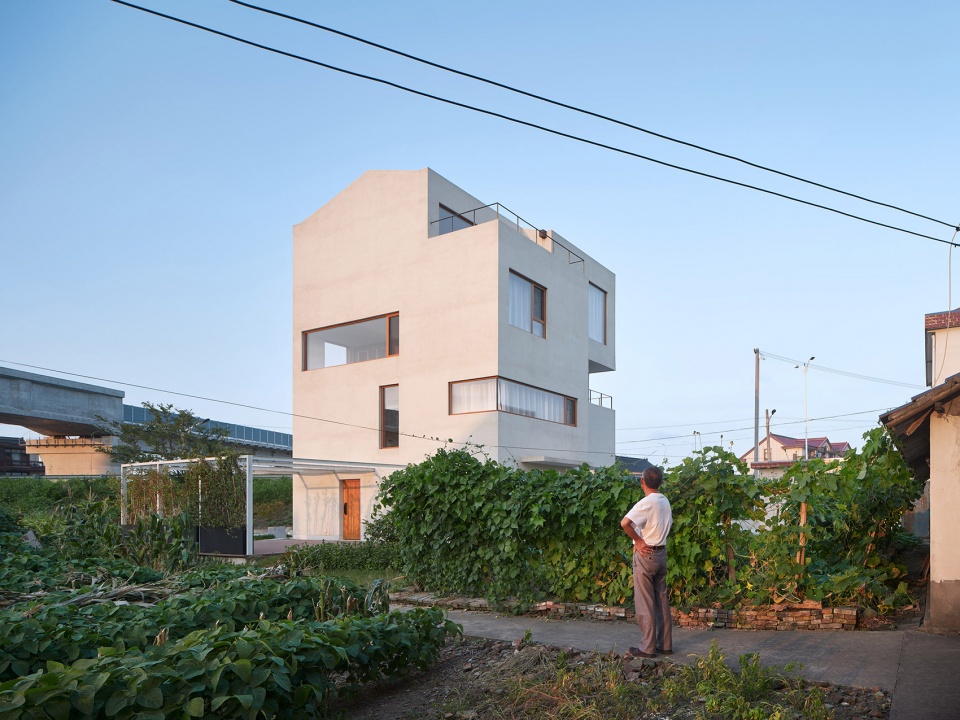
启东的乡建规定较为严格,要求彭宅必须在原轮廓线内完成翻新(基底面积90平米),外观效果也应当与原始“火柴盒”相吻合。待翻新的老宅建设于上世纪80年代,是一栋标准的农村楼房,这种简易标准的农村楼房也由于其经济性,影响了那个年代大江南北的乡村风貌。
Qidong’s rural construction regulations are strict, requiring that the renovation of the Peng’s residence be completed within the original contours (90 square meters of base area), and that the appearance should match that of the original “matchbox”. The old house to be renovated was constructed in the 1980s as a standard rural building, a simple standard rural building which, due to its affordability, influenced the countryside of that era in the north and south of the Yangtze River.
▼建于80年代的老宅,The old house built in the 1980s ©立木
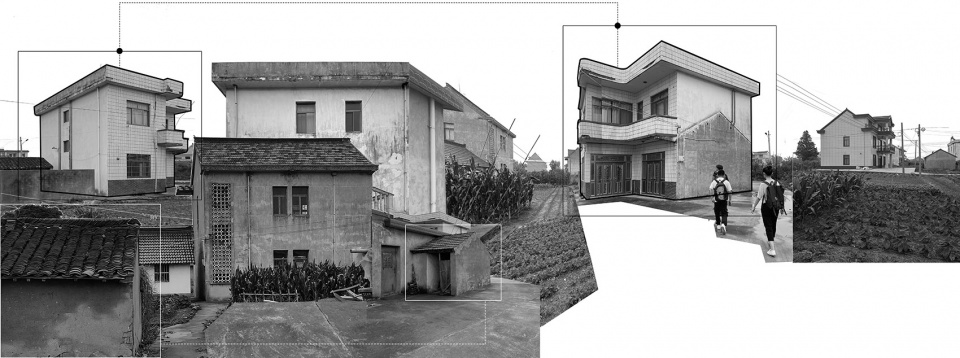
这是一个颇具挑战的设计,既不是城里人的附庸风雅,也不只是农村人的现代改善,而是需要在一个充满限制的框架内,完成一个让城乡三代人感到舒适的日常空间。
This is a challenging design, neither the city people’s attachment to elegance, nor just the rural people’s modern improvement, but the need to complete a comfortable daily space for three generations of urban and rural people within a framework full of limitations.
▼区位关系,Location ©立木
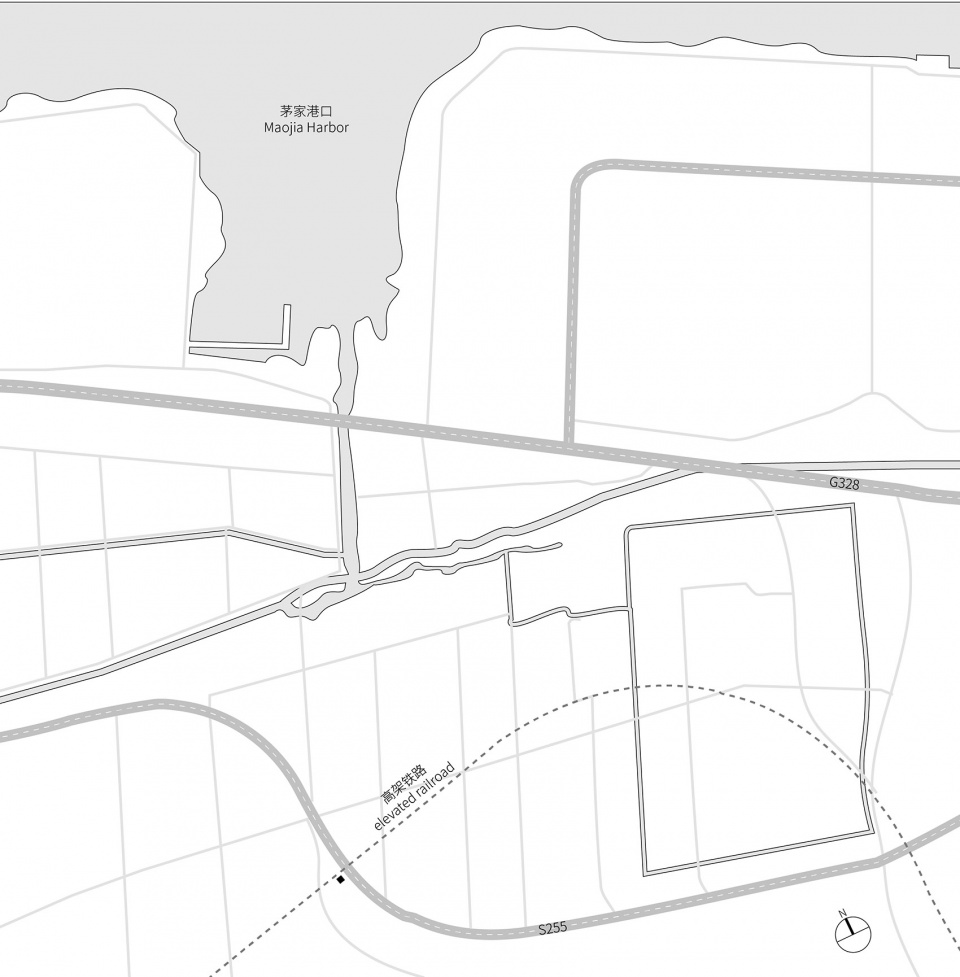
▼背靠渔港,Backed by the fishing harbor © 朱清言
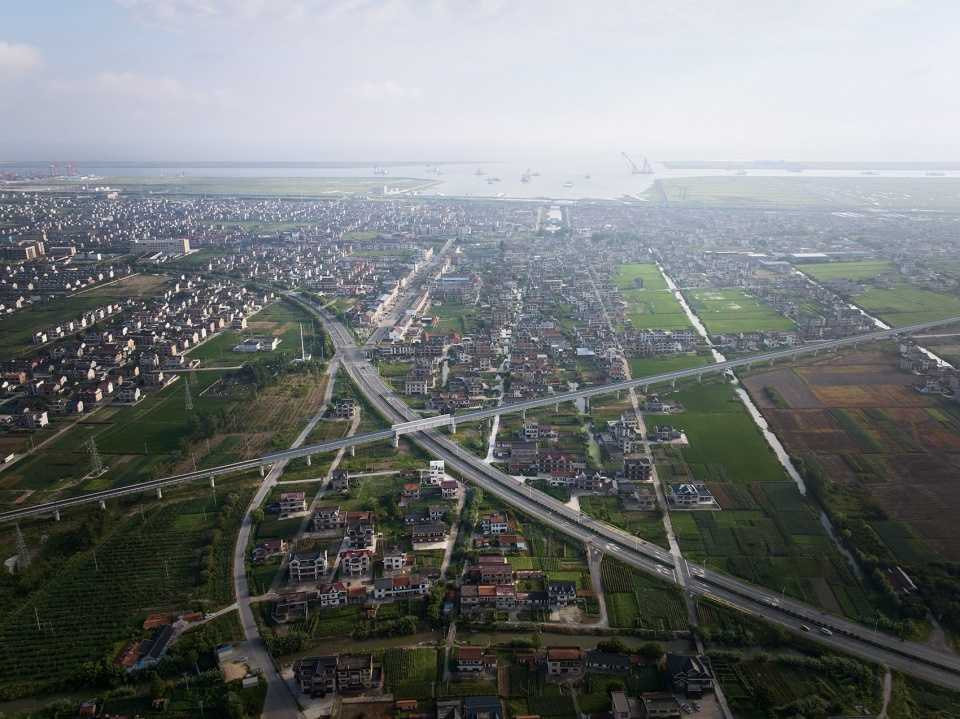
▼顶视影像,Aerial view © 朱清言
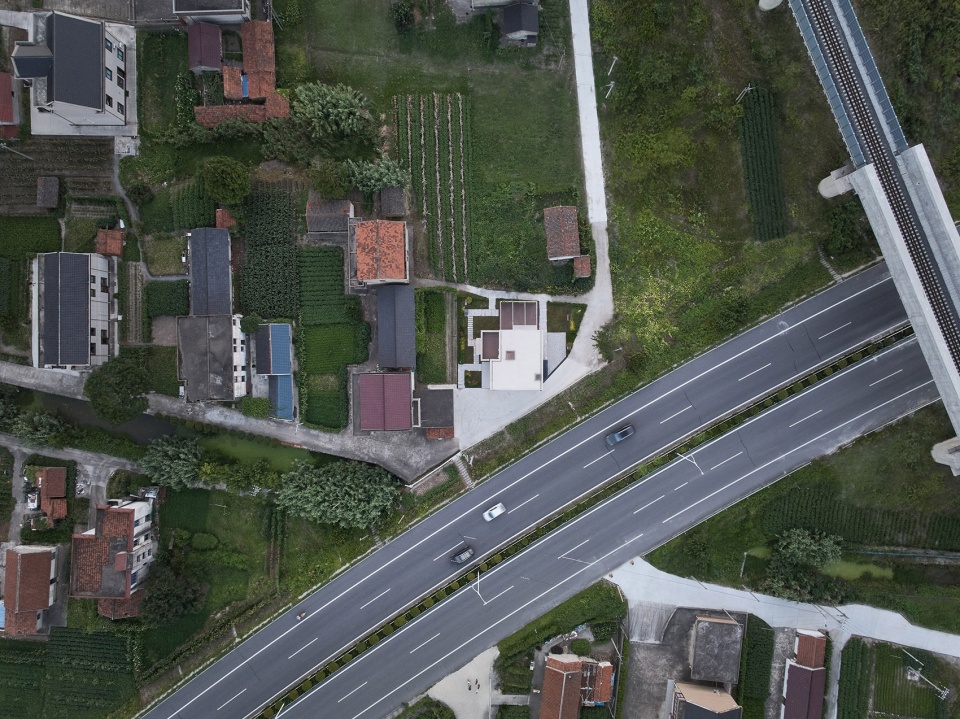
基地位于村庄尽端,背靠高铁与公路,车辆的轰鸣声不绝于耳。因此彭宅面向公路和铁路的东侧与北侧都几乎没有开窗,使它如同一座碉堡,顽强地抵抗着滚滚而来的城镇化浪潮。彭宅可开启的窗户都位于面向村子的西侧与南侧,为避免可能导致无限期停工的村民举报,建筑没有任何超出基底轮廓的出挑。彭宅谨慎小心地与这片熟悉又陌生的田野对话,仿佛一个试图归来的旅人。
The project site is located at the end of the village, backed by the high-speed railway and highway, where the roar of vehicles is incessant. Therefore, there are almost no windows on the east side and north side of the house facing the highway and the railroad, which makes it like a fortress, tenaciously resisting the rolling wave of urbanization. The windows that do open are located on the west and south sides of the building facing the village, and to avoid reports from villagers that could lead to an indefinite suspension of construction, the building does not extend beyond the contours of the foundation. Peng’s house cautiously talks to this familiar yet unfamiliar field, as if it were a traveler trying to return.
▼菜地与新彭宅,Field and new Peng’s House © 朱清言
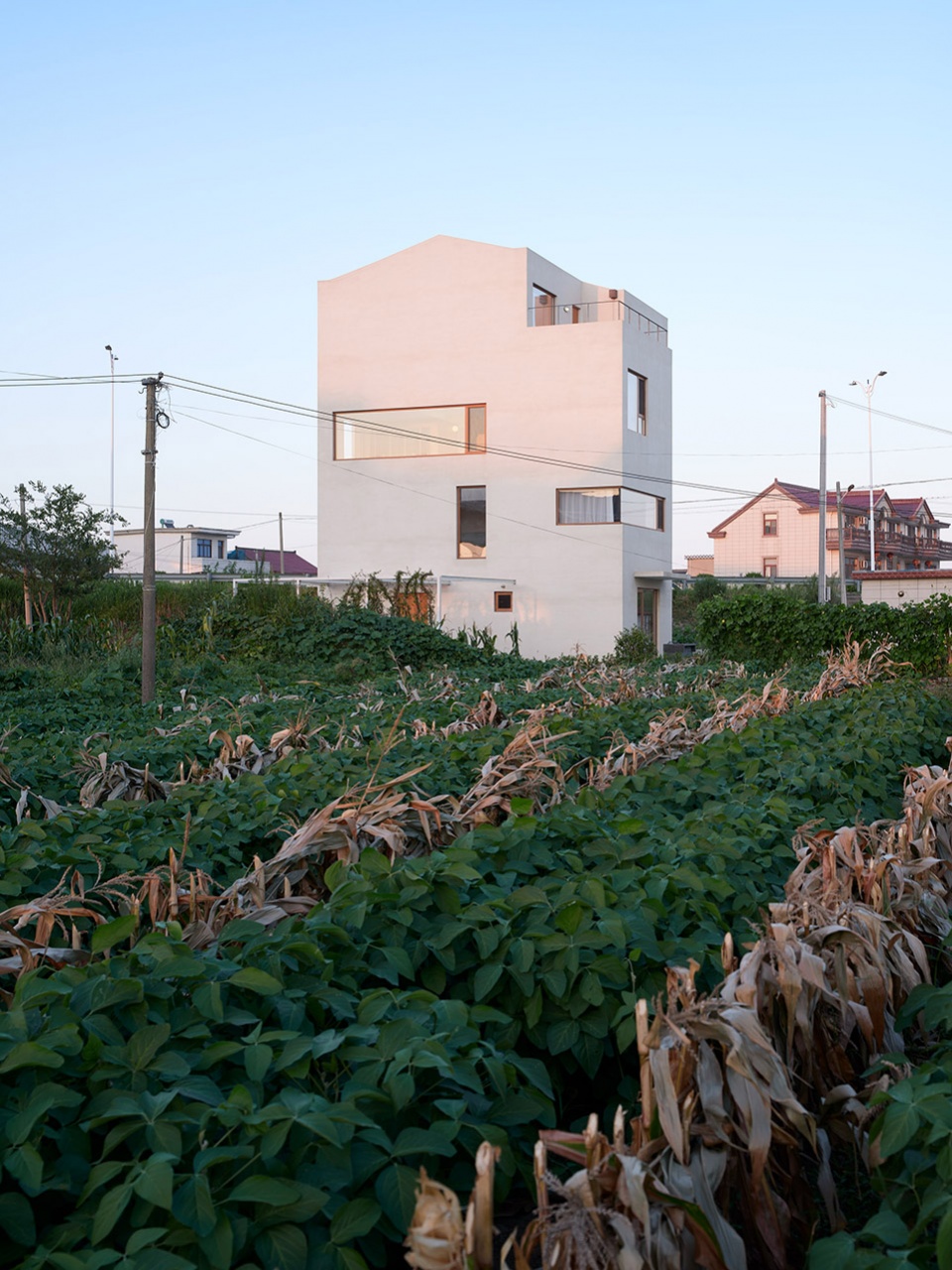
▼朝向公路与铁路的立面,The façade face to highway and railway © 朱清言
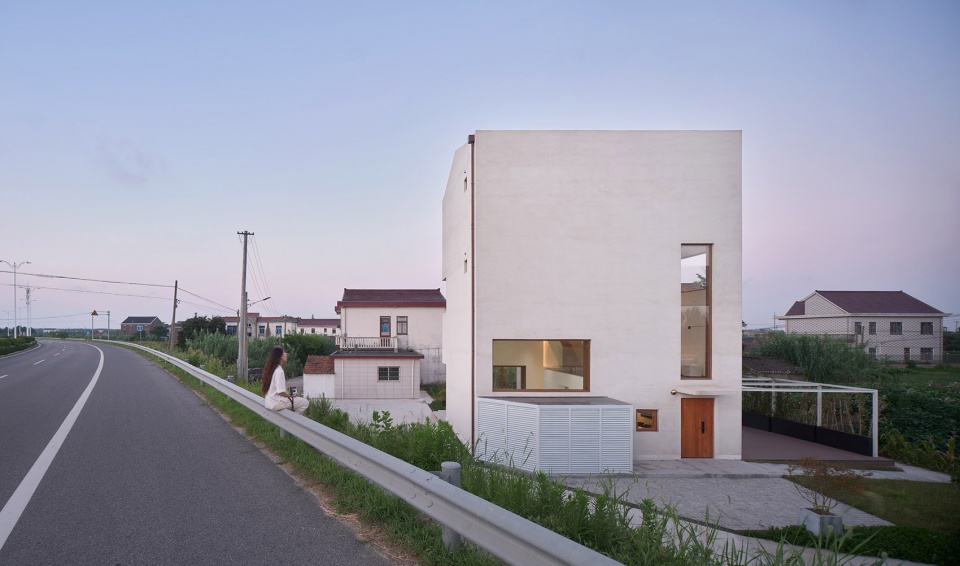
▼高架铁路与村庄,Elevated railroad and villages © 朱清言
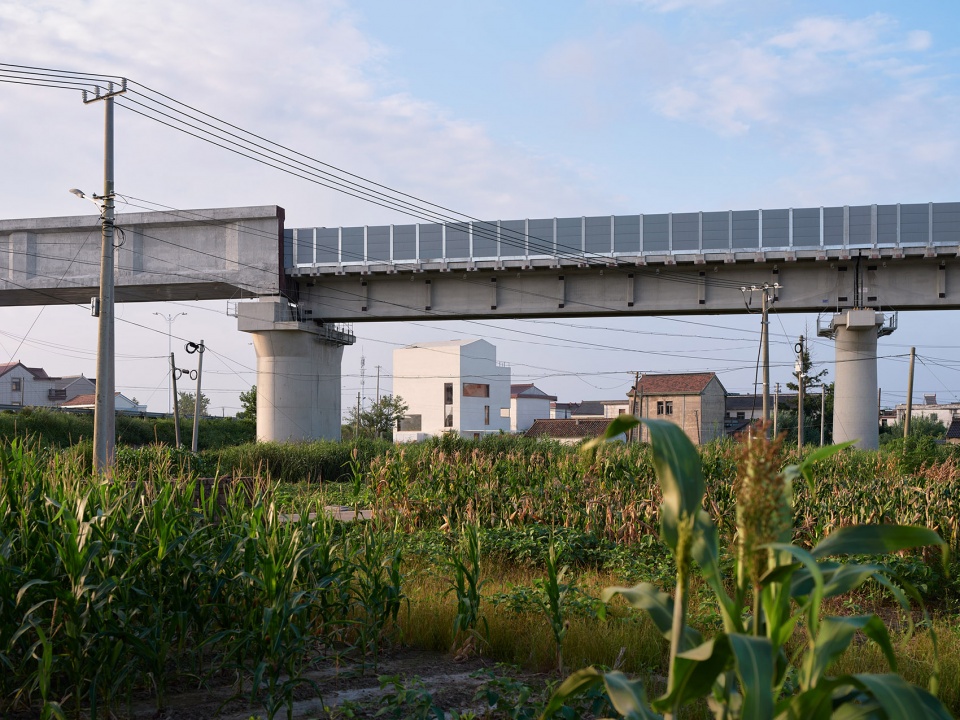
▼夜晚的公路与彭宅,Highway and Peng’s House at night © 朱清言
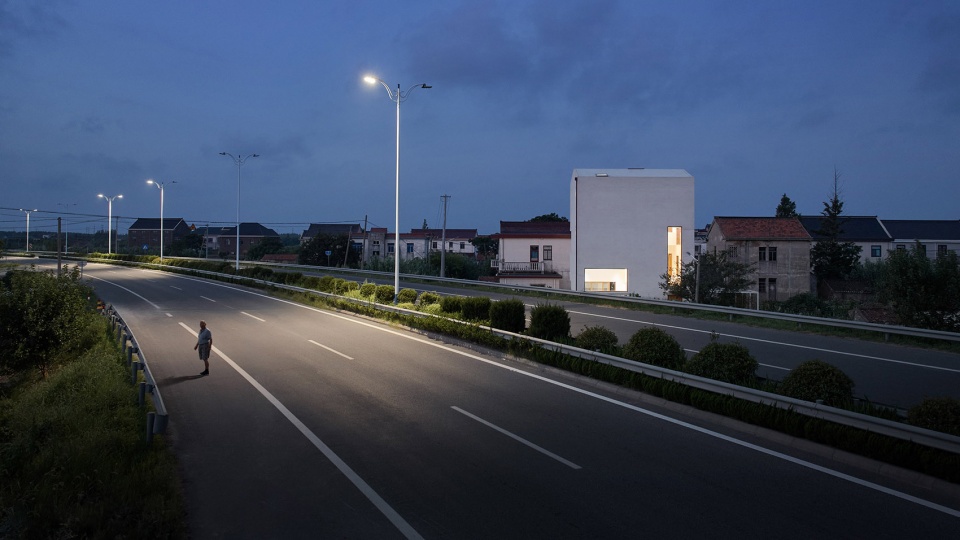
尽管一切都符合规定与流程,有丰富乡建经验的建筑师朋友还是提醒我们用“拆一半造一半”的方式翻新,这不仅意味着建造难度与造价的激增,也实际上影响了方案的生成逻辑——从剖面开始。
Despite the fact that everything was in accordance with the rules and procedures, our architect friends with extensive experience in rural construction reminded us to renovate the building by “half demolition and half construction”, which not only implies an increase in the difficulty and cost of construction, but also actually affects the logic of generating the program – starting from the Starting from the profile.
▼“拆一半造一半”形成的老宅剖面,Sections of old houses created by “half demolition and half construction”© 立木
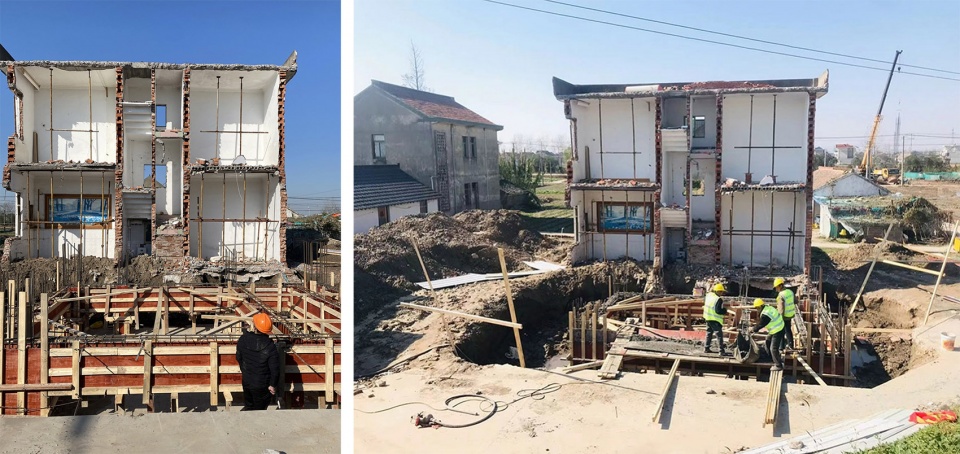
▼剖面拼合,Sectional assembly © 立木
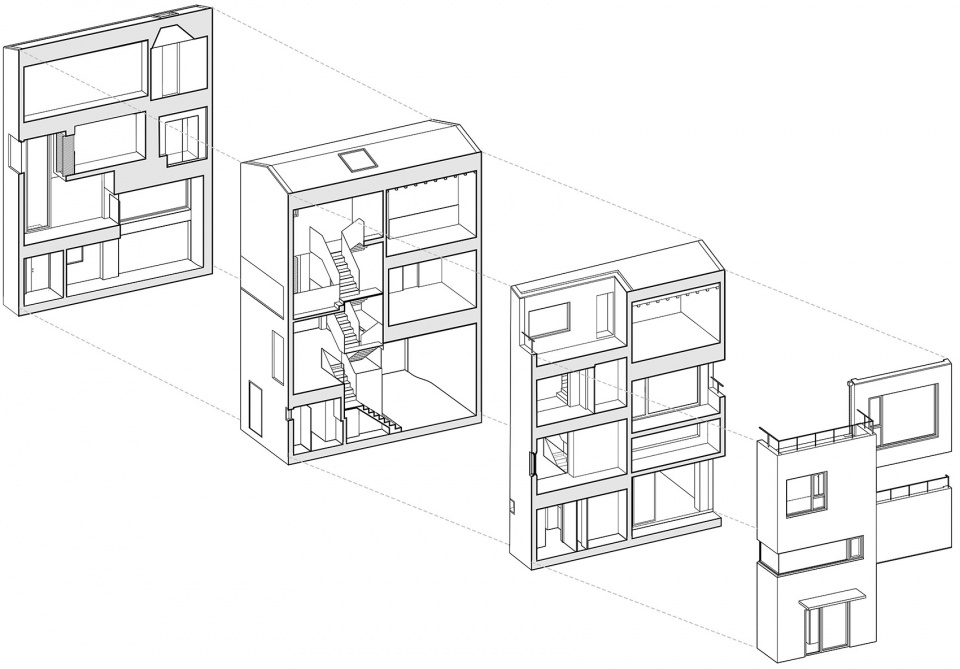
▼菜地视角看彭宅,Peng’s House from the viewpoint of a vegetable patch © 朱清言
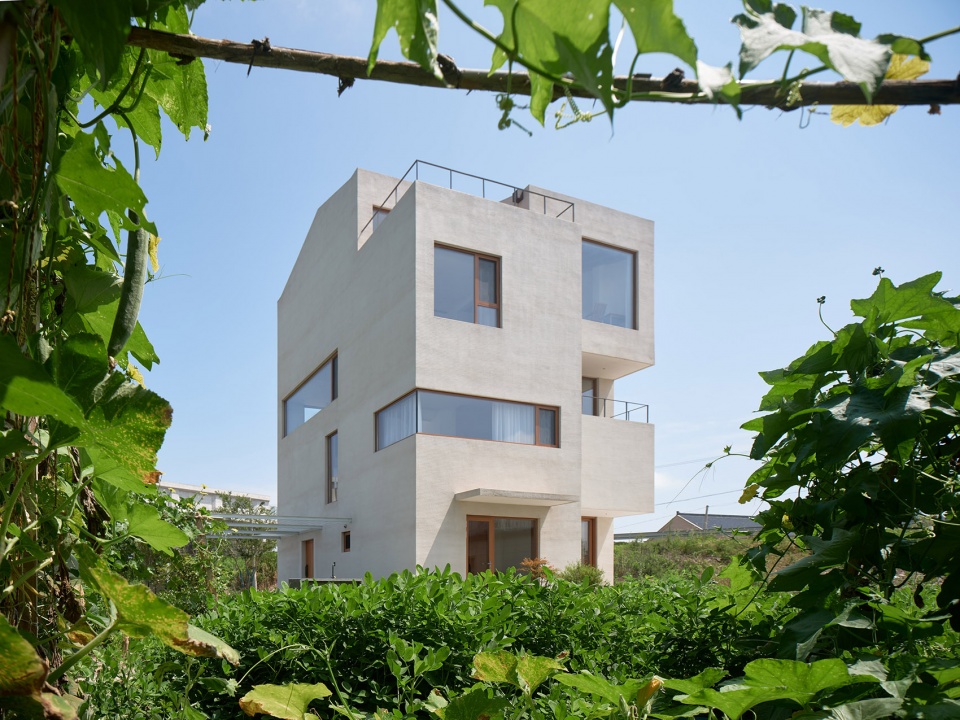
▼草地中望向彭宅,Looking out to the Peng’s House over the meadow © 朱清言
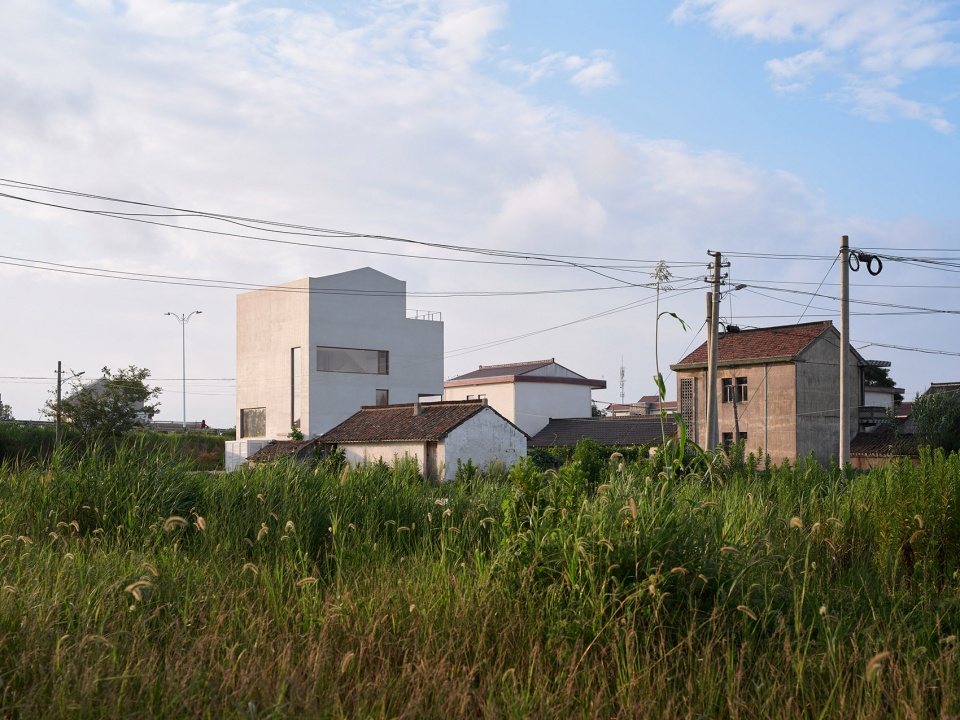
▼逐步老龄化的村子,The gradually aging village © 朱清言
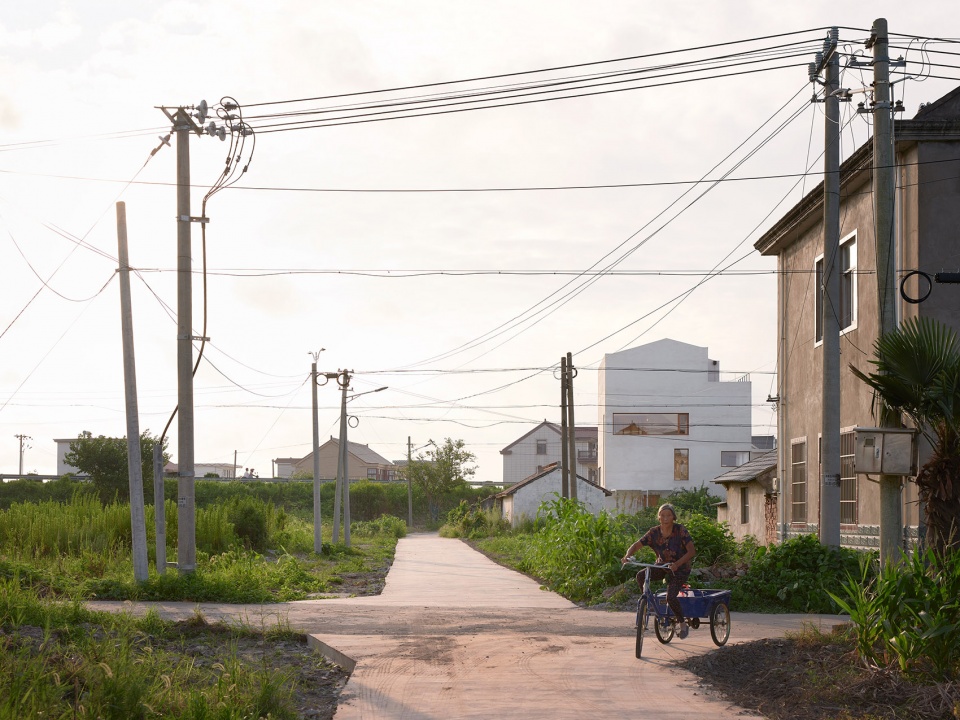
伴随着乡土社会支离破碎的过程,村子的邻里关系逐渐变得微妙,利益与亲缘两条线索同时在支配着逐渐松散的社会网络。在开工之前,业主非常自信的保证施工一定会一切顺利,因为村子里不仅一部分邻居沾亲带故,家人们也挨家挨户地打过招呼。但举报和争吵依然如期而至,最终原本的鸡舍与柴房部分经过多轮努力依然无法保住,照片与遥感影像都无法证明它曾经的存在。
Along with the process of fragmentation of the rural society, the relationship between the neighbors of the village has gradually become delicate, with two threads of interest and kinship dominating the loosening of the social network at the same time. Prior to the start of the construction, the owner was very confident that everything would go smoothly, as not only some of the neighbors in the village are related to each other, but also the families have been greeted from door to door. However, reports and quarrels still came as expected, and in the end, the original chicken coop and firewood house could not be saved after many rounds of efforts, neither photos nor remote sensing images proved that it had ever existed.
▼南侧立面,South side elevation © 朱清言
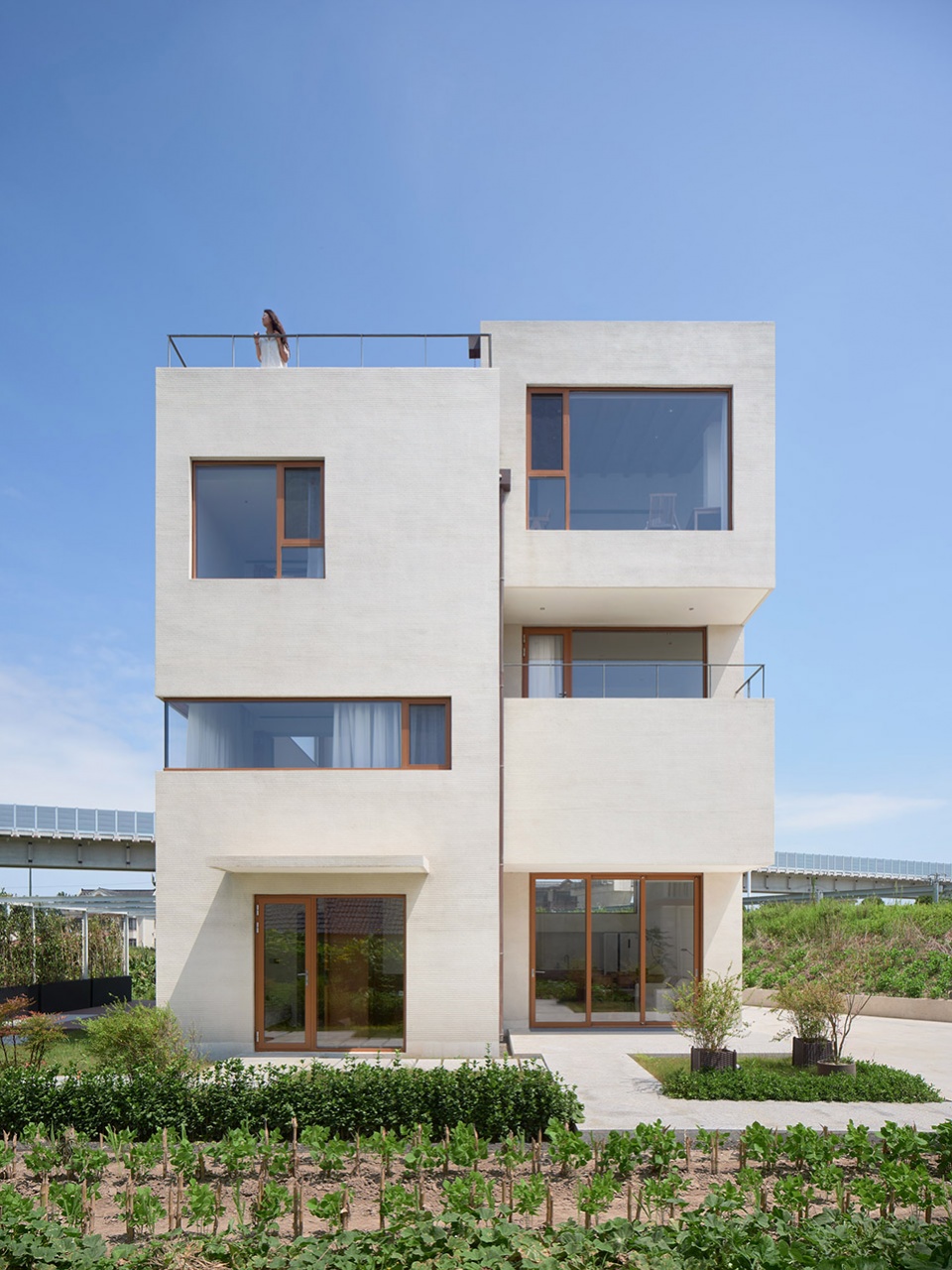
令人侥幸的是,主体建筑经过两个剖面的拼合,最终能够翻新建成。失去附属小平房之后的彭宅在气质上变得清冷,最终我们不得不接受了这座略显孤傲的房子。原先准备作为麻将室的附属平房以葡萄架的形式延续,彭老先生依然可以和邻居们在此打麻将,除了失去屋顶和围护,一切一如从前。这仿佛是对于彭先生一家“归园田居”的隐喻,这一个上下左右都由剖面拼合而成的建筑,是某种变化中的城乡异质混合的结果,尽管它看起来与老屋似曾相识,但又已经完全不同。
▼剖面光影,Section light and shadow ©立木
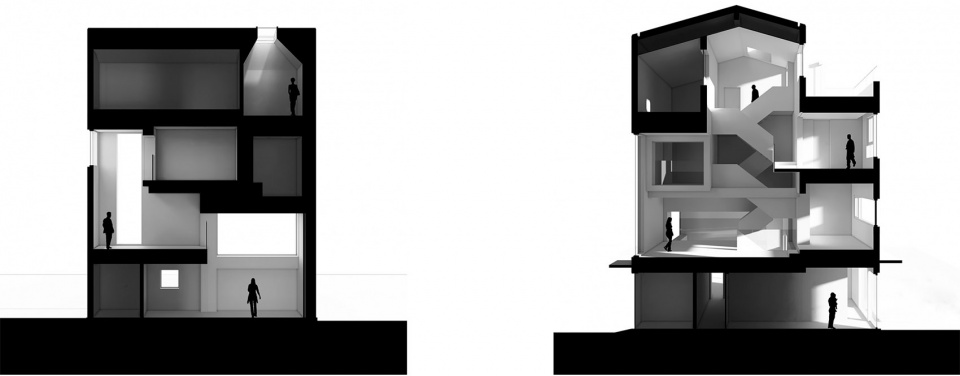
By a stroke of luck, the main building was eventually renovated after two sections were put together. With the loss of the small attached bungalow, the Peng’s House became cooler in atmosphere, and eventually we had to accept this slightly lonely house. The annexed bungalow, which was originally intended to be a mahjong room, was continued in the form of a grape arbor, where Mr. Peng’s father could still play mahjong with his neighbors, and everything was as it was in the old days, except for the loss of the roof and the enclosure. It seems to be a metaphor for Mr. Peng’s family’s “return to the field”, a building made up of sections on the top, bottom, left and right, the result of some kind of changing heterogeneous mix of urban and rural areas, which, although it looks similar to the old house, is completely different from the old one.
▼等候烟火的夜晚,Waiting for the firework at night © 朱清言
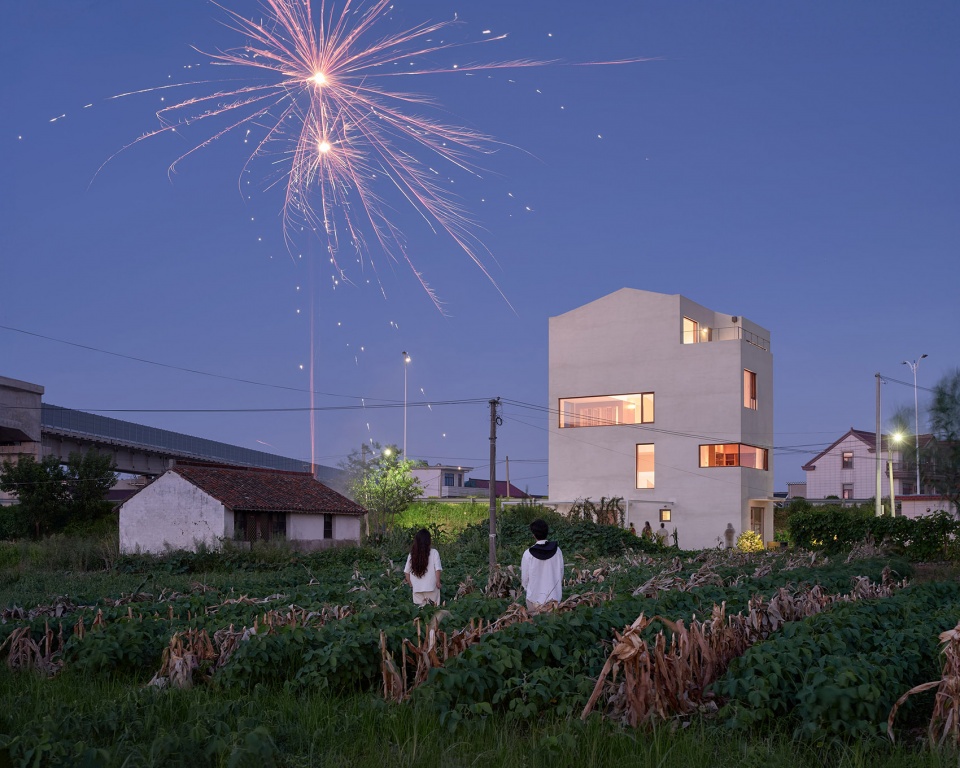
乡——堂屋与厢屋
Countryside – the hall and the compartments
需要考虑老人百年后举办后事的地方,这甚至是设计任务书的唯一要求,这使彭宅在类型学上区别于别墅或民宿。翻新前的老宅设一堂屋一厢屋,除堂屋外,一层厢屋居住长辈,二层则是子女卧室,这也是80年代最适应当地风俗习惯的楼房原型。
The need to consider a place to organize the afterlife of the elderly after their passing away, which was even the only requirement in the design brief, distinguishes Peng’s Mansion from villas or B&Bs in terms of typology. Before the renovation, the old house had a hall and a wing, except for the hall, the first floor of the wing housed the elders, and the second floor was the children’s bedroom, which was the most adaptable building prototype in the 1980s to the local customs and habits.
▼夜晚的彭宅,Peng’s house in the evening © 朱清言
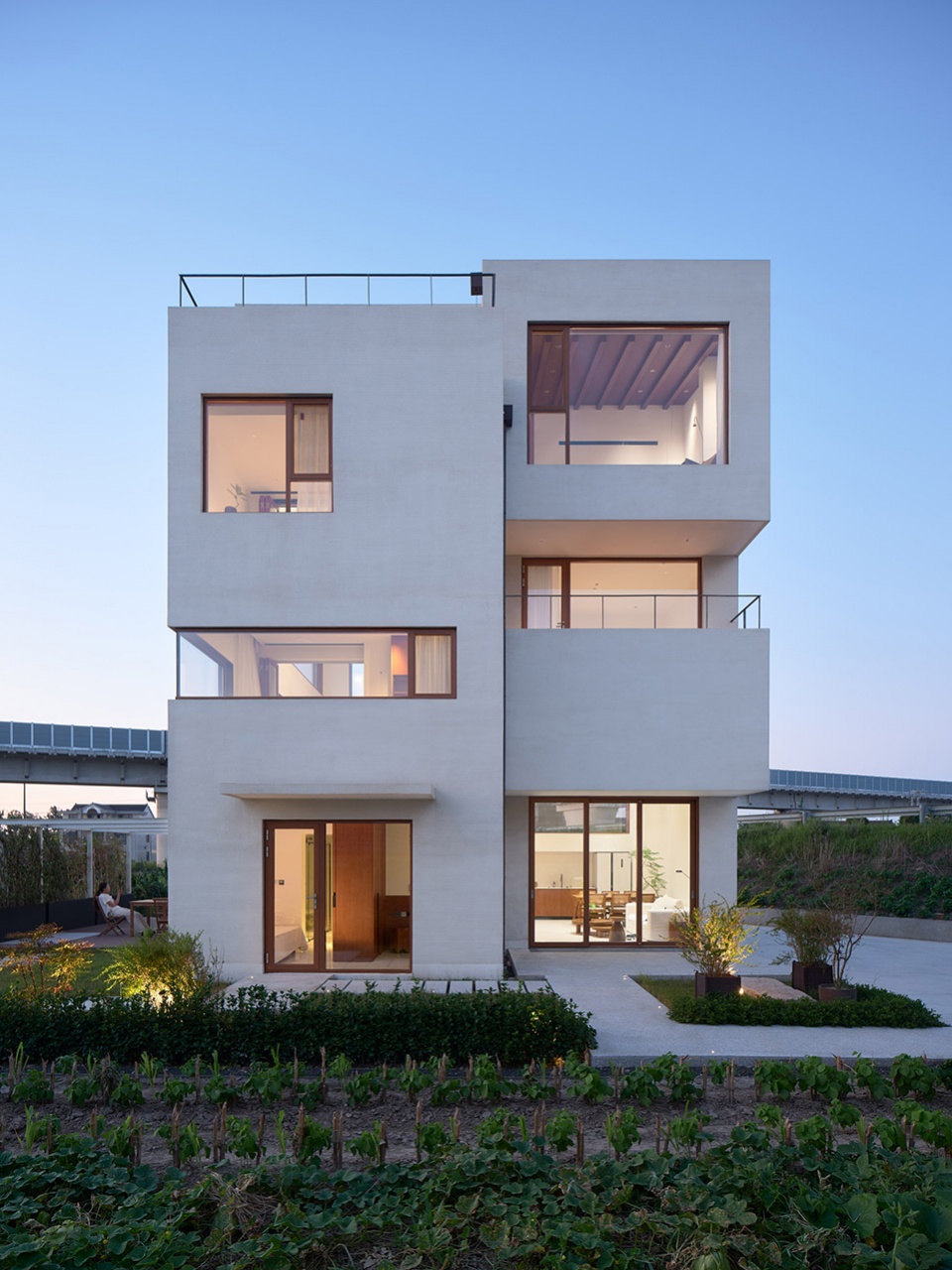
▼人间烟火,The hustle and bustle of the country life © 朱清言
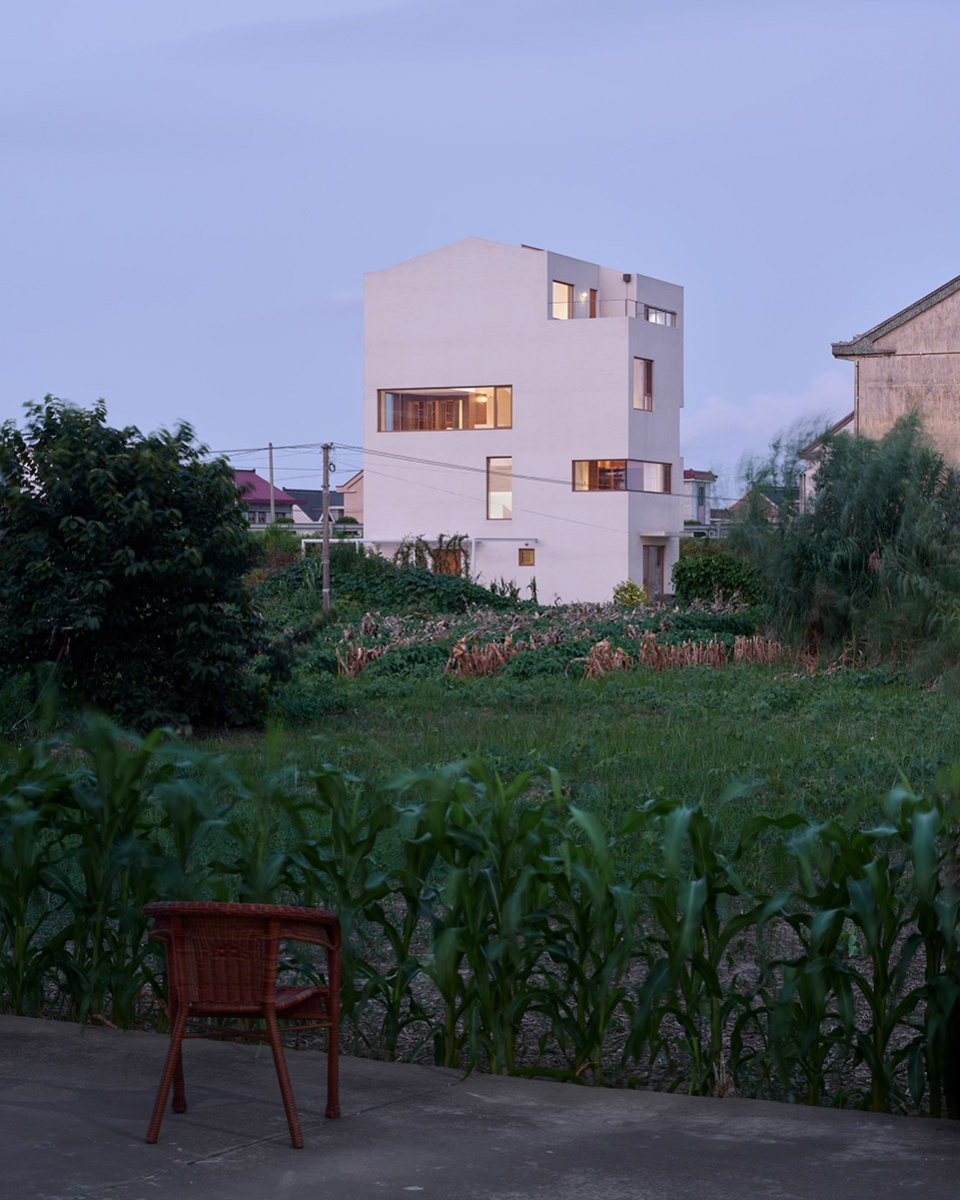
堂屋是传统民居中的礼仪空间,用于尊祖敬神、祭天拜地、婚丧寿庆等。在中国乡村,红白喜事是乡土社会关系的重要连接点,虽然随着城市化进程,年轻人的婚礼逐渐“洋气”,一般已不在家中举办,但老人们的丧礼依然延续着“传统”。一家老人过世,停灵在堂屋,天数由风水先生根据生辰八字计算,全村都会来帮忙张罗,洗菜做饭,接待宾客等等。对于彭老先生来说,自己的后事是否办得合适且体面,儿子媳妇对宾客和乡邻们能否都尽到礼数,是最为要紧的事情。
The hall is a ceremonial space in traditional houses, used for honoring ancestors and gods, worshiping heaven and earth, and celebrating weddings, funerals and birthdays. In the Chinese countryside, weddings and celebrations are an important link in local social relations. Although young people’s weddings are becoming more and more “foreign” as a result of urbanization, and are generally no longer held in the home, the funeral ceremonies of the elderly still continue to be “traditional”. When an old man passes away, the spirit will stop in the hall, and the number of days will be calculated by the Feng Shui master according to the eight characters of the birth date, and the whole village will come to help to organize, wash and cook, and receive guests and so on. For Old Mr. Peng, the most important thing is whether his funeral is done properly and decently, and whether his son and daughter-in-law can do their best for the guests and neighbors.
▼堂屋——我家大门常打开,Parsonage – my door is always open © 朱清言
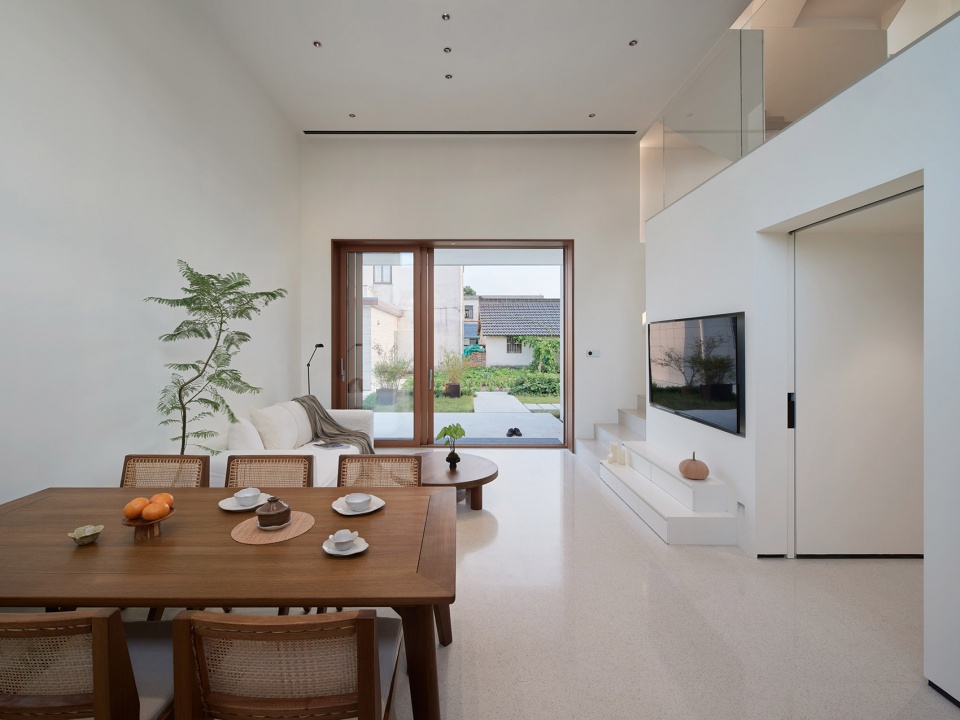
▼北侧的高窗带来柔和的漫反射,High windows on the north side bring in soft diffused light © 朱清言
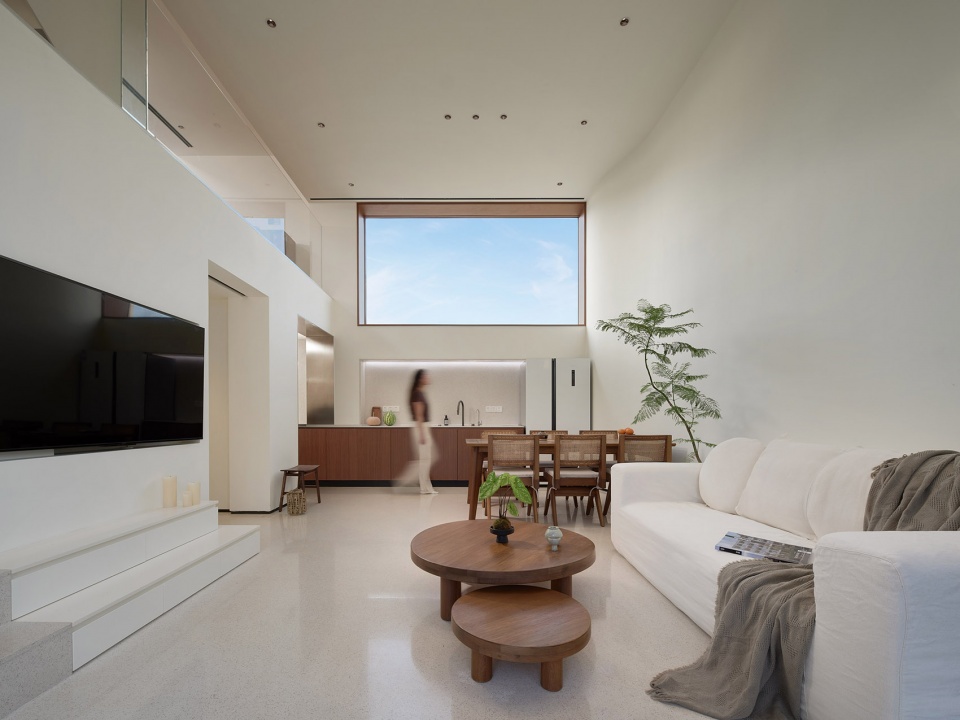
▼西厨与餐厅,Western kitchen & dining hall © 朱清言
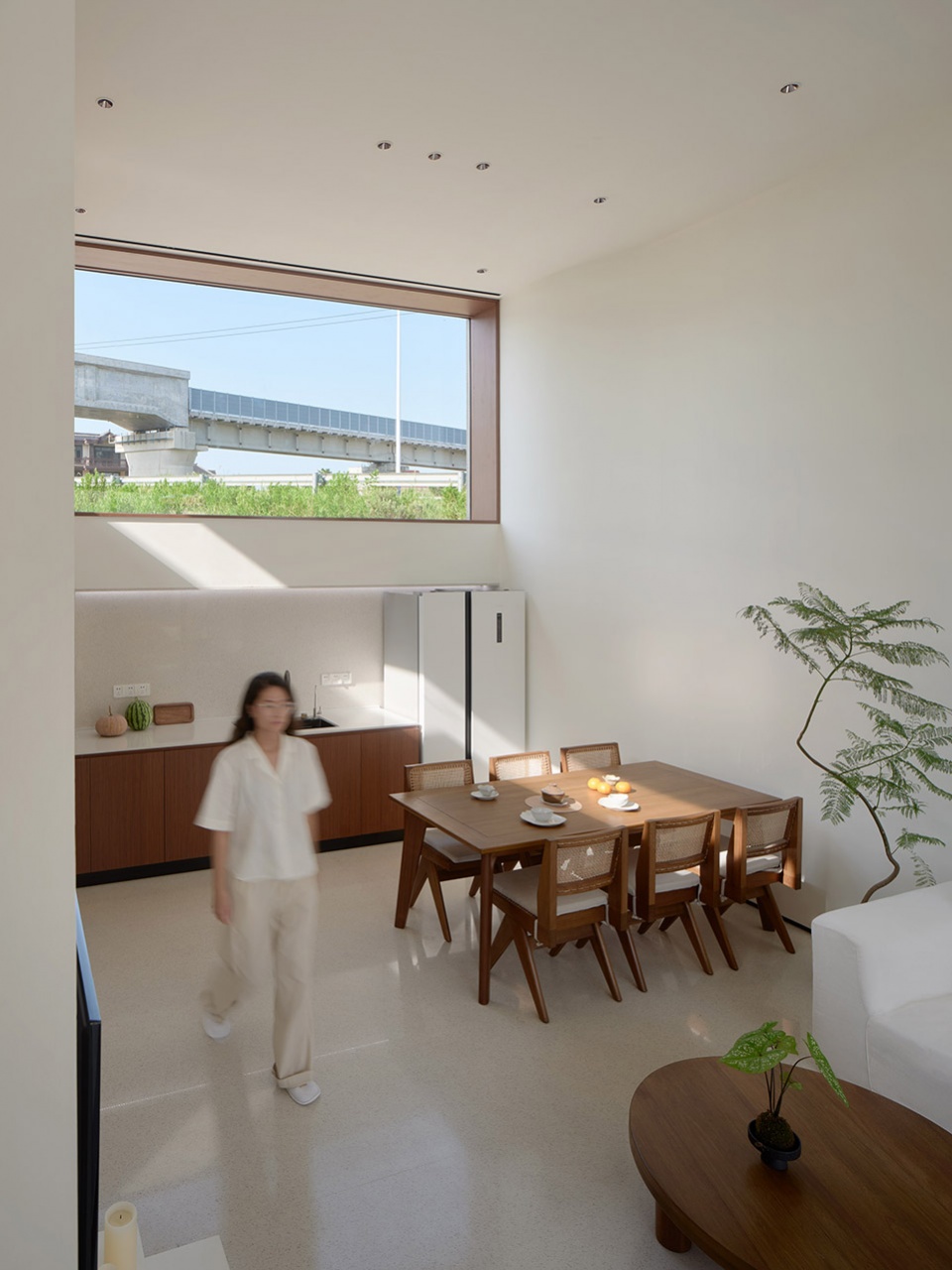
▼中厨,Chinese kitchen © 朱清言
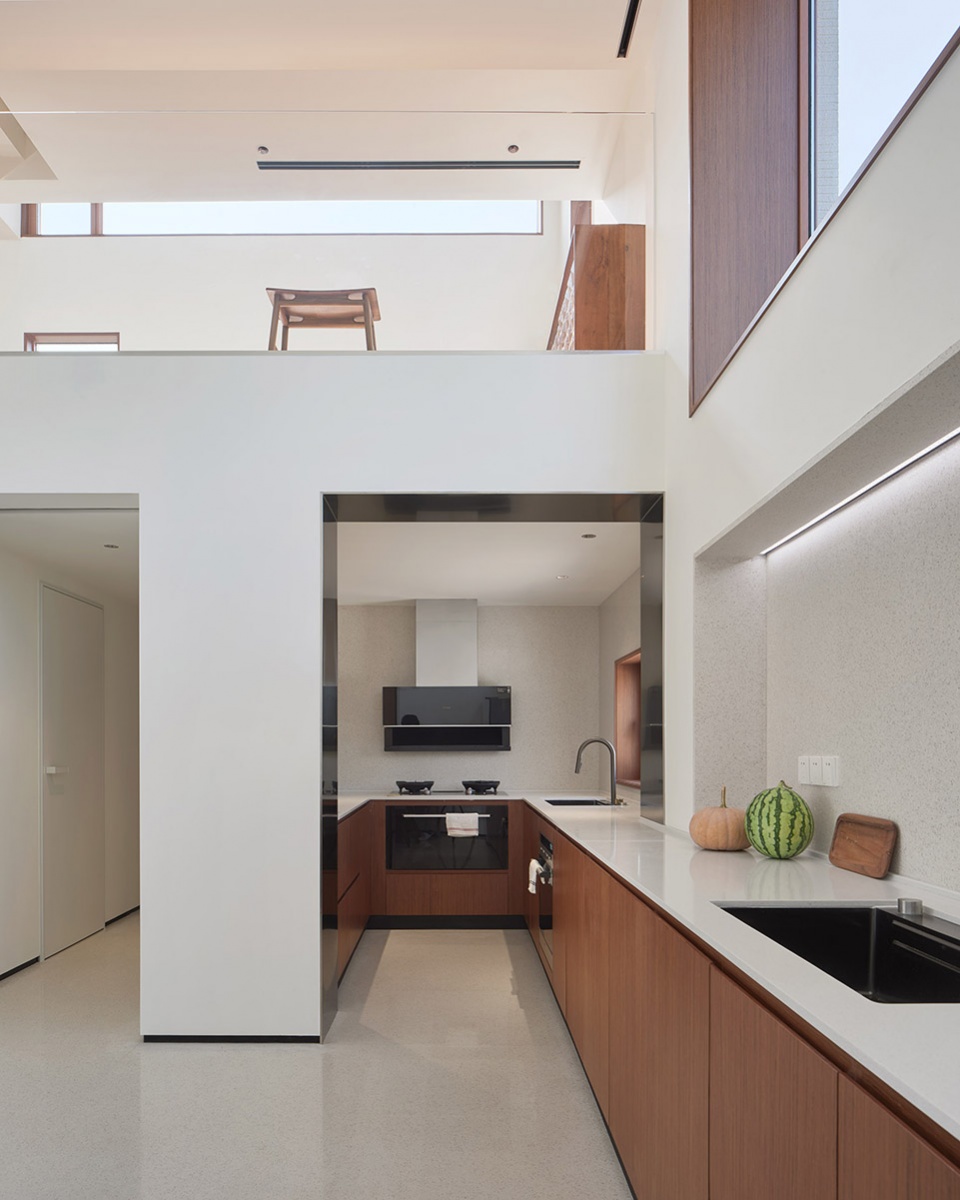
乡村生活没有秘密,乡邻们会随时到访,彭宅因循乡邻的普遍作法,也不设院墙。设计一层延续了传统的堂屋与厢屋的空间组合,堂屋大门常开,厢屋为老人居室,“一堂一厢”适应老一辈的日常生活,户型细节在传统格局的基础上进行了适老优化。过去堂屋正中对景一般为香案,挂中堂画,作为祭拜所用。新彭宅已无此类需求,设计将这一对景转译为西厨与高窗,蓝天白云入画,也为堂屋带来柔和的照明。
As village life has no secrets and neighbors would visit anytime, Peng’s house followed the common practice of his neighbors and did not have a courtyard wall. The design of the first floor continues the traditional space combination of the hall and compartments, with the main door of the hall always open and the compartments for the elderly, “one hall and one compartment” adapting to the daily life of the older generation, and the details of the house type have been optimized for the elderly on the basis of the traditional pattern. In the past, the view in the center of the hall was usually an incense burner, and the painting in the middle of the hall was used for worship. In the new Peng’s House, there is no longer such a need, so the design translates this pair of views into a western kitchen and high windows, where the blue sky and white clouds enter the painting, and also bring soft lighting to the hall.
▼堂与厅,Hall and chamber © 朱清言
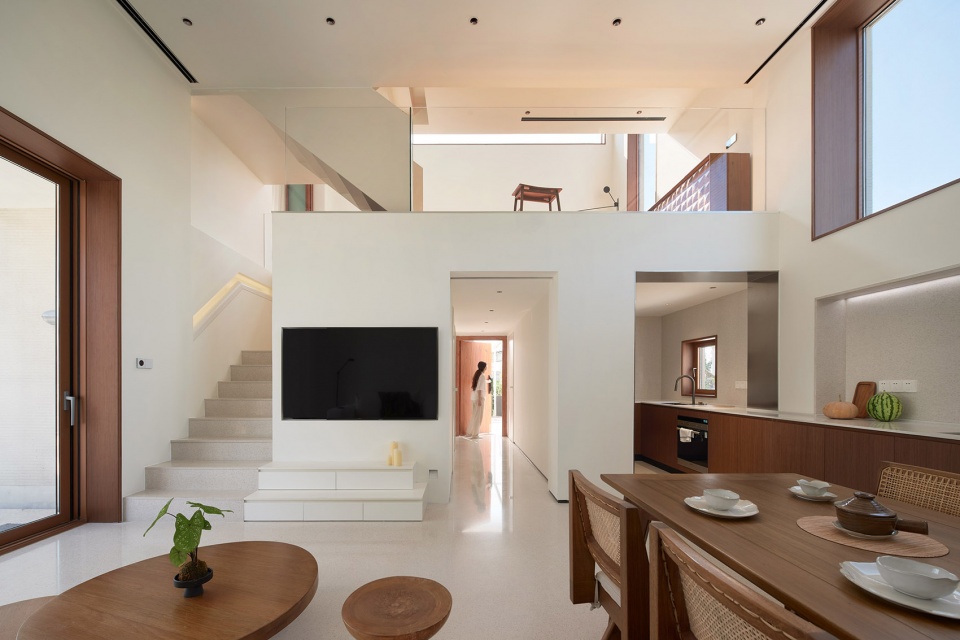
▼适老化的一层卧室,Age-friendly first floor bedroom © 朱清言
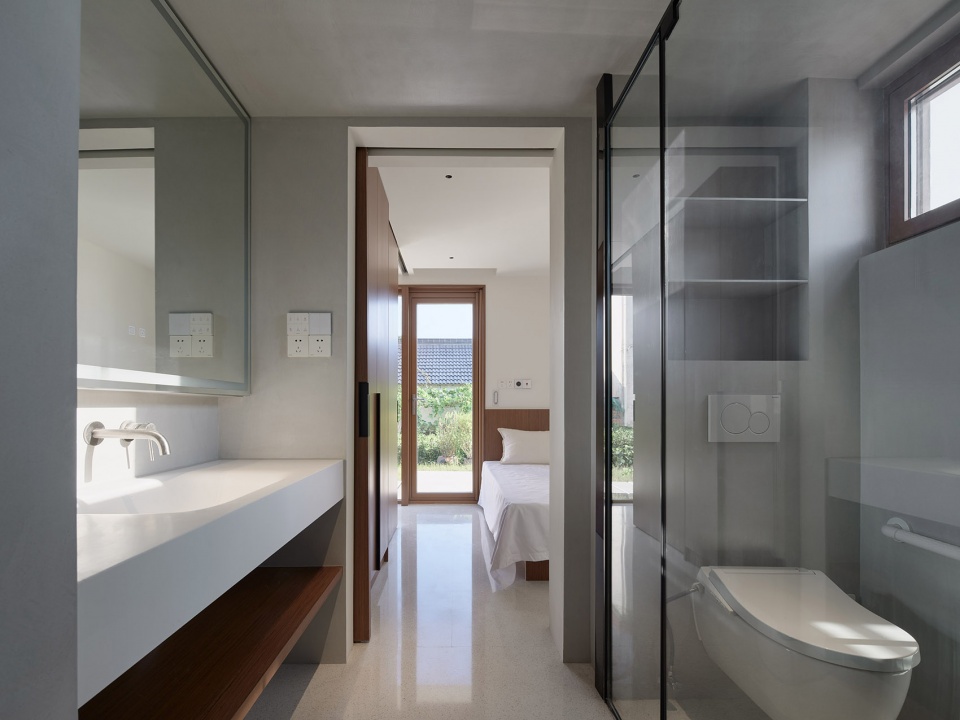
新彭宅一层使用与老宅一致的水磨石地面,老人和乡邻进出大多经过泥土地,鞋底较脏,水磨石结实耐用、方便打理。老人房的双卧室设有独立对外的门,白天常开,也可以通过西侧门与葡萄架直接相连,乡邻们也时常来小坐。和风穿堂、往来闲谈,这是家中50后老一辈所熟悉的,属于乡村熟人社会的生活方式。
The terrazzo floor on the first floor of the new Peng’s House is the same as that of the old house, as the elderly and the neighbors pass through the dirt floor, where the soles of their shoes are dirty, and the terrazzo is durable and easy to take care of. The double bedrooms in the old man’s house have independent external doors, which are always open during the day, and can also be directly connected to the grape arbor through the door on the west side, where neighbors often come to have a seat. This is the familiar lifestyle of the old generation of whom born in the 50s, which belongs to the countryside acquaintance society.
▼西侧门与葡萄架,West side door with grapevine © 朱清言
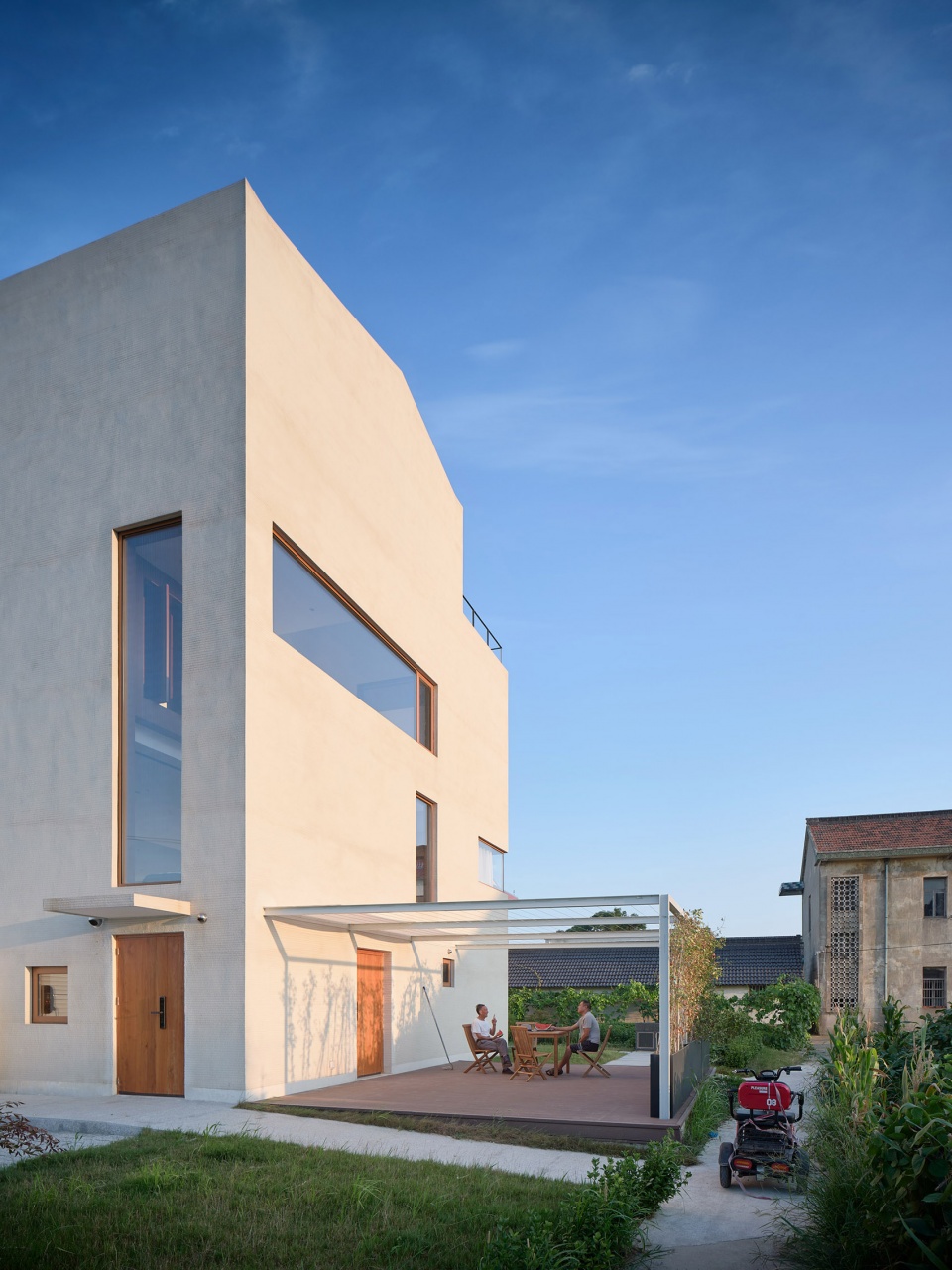
▼北侧立面,North elevation © 朱清言
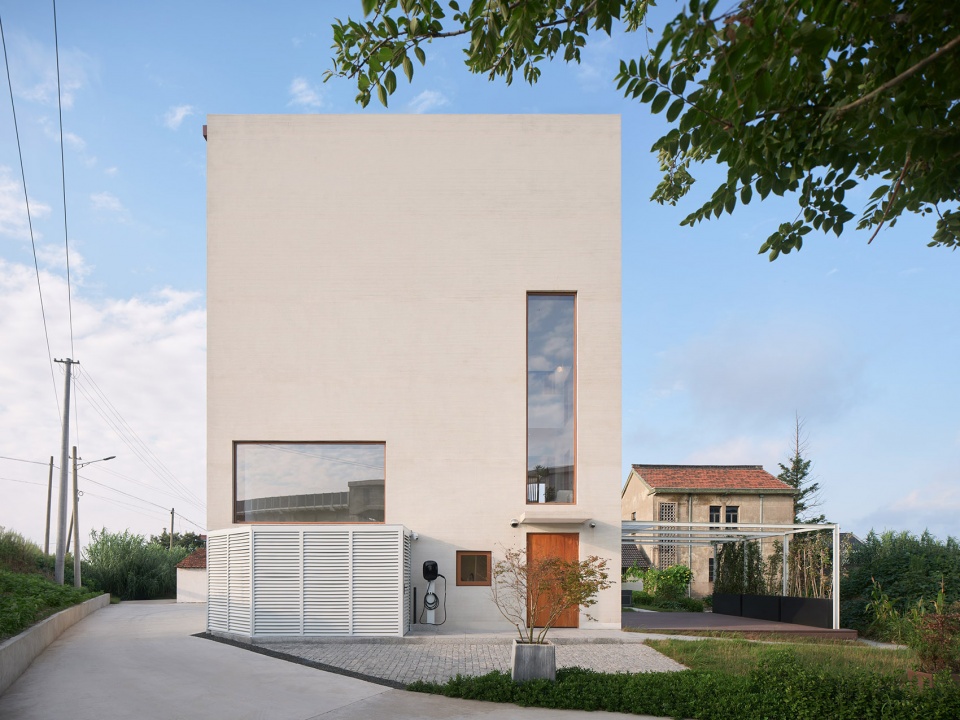
▼不设围墙的开放院落,Open courtyard without walls © 朱清言
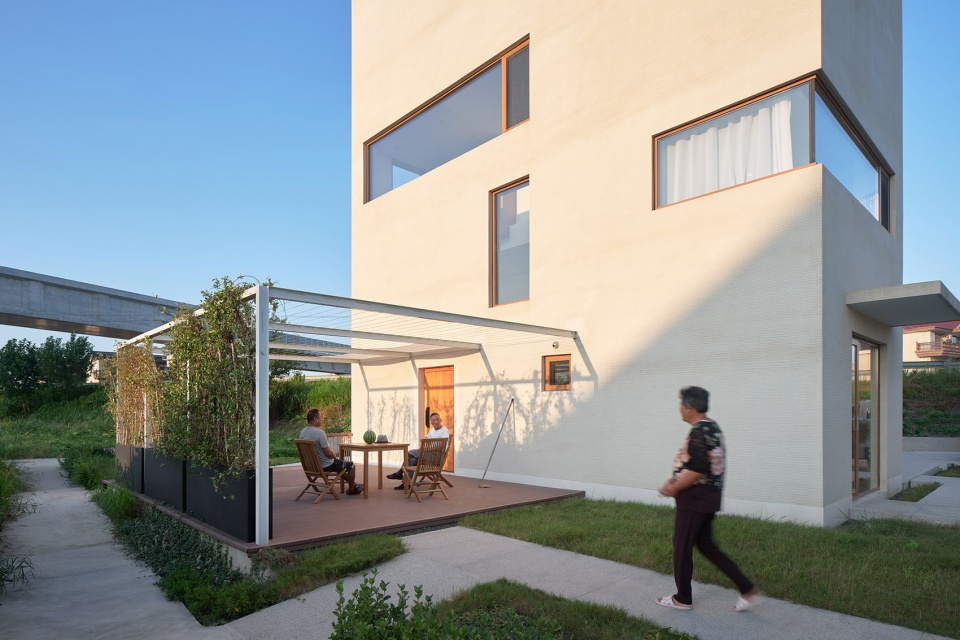
▼木平台上吹风聊天,Chatting in the breeze on the wooden platform © 朱清言
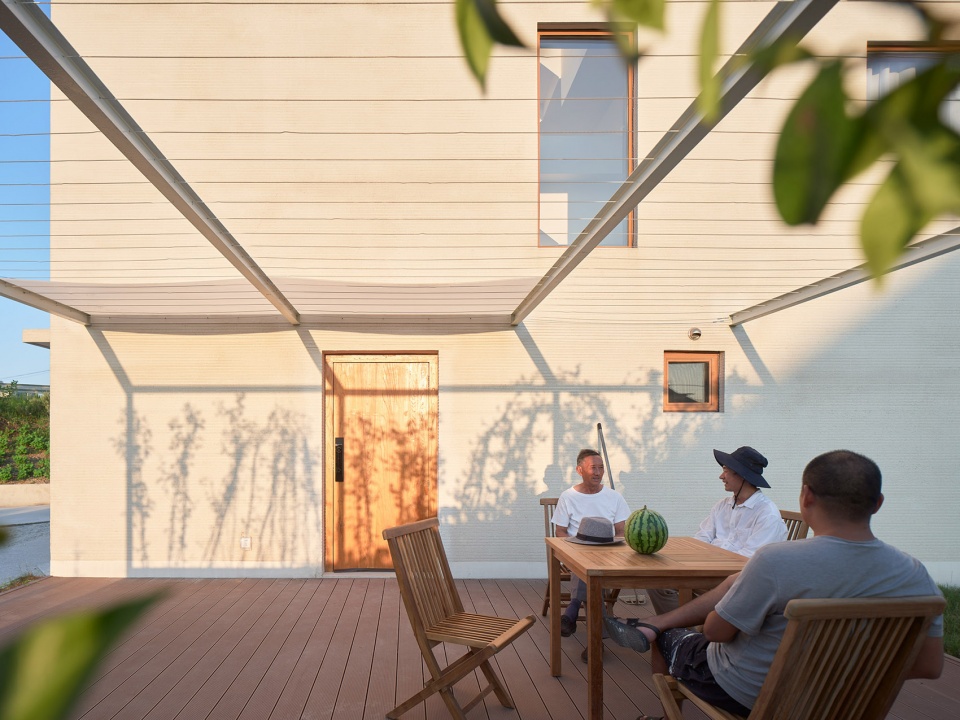
城——公区与私域
City – Public and Private Areas
二层以上是80后子女一家的生活空间,通过换鞋这个简易仪式,提示人们将进入一个更为私密的领域,也谢绝了不速之客的突然造访。二层设有起居室与书房,它是实际意义上的现代住宅客厅,80后子女一家在此起居与会客。起居室联通上下两个中庭,是“城”“乡”连接点,高达10米的通高赋予这个空间强烈的仪式感,也将二层以上的小家庭生活联系在一起。
Above the second floor is the living space of the 80s children’s family. Through the simple ritual of changing shoes, people are reminded that they will enter a more private area, and they are also denied of sudden visits from uninvited guests. On the second floor, there is a living room and a study room, which is the actual living room of a modern house, where the children of the 80s live and meet their guests. The living room is connected to the upper and lower atriums, a point of connection between the city and the countryside, and with a height of 10 meters, it gives the space a strong sense of ceremony and connects the small families living above the second floor.
▼新与旧,New and old © 朱清言
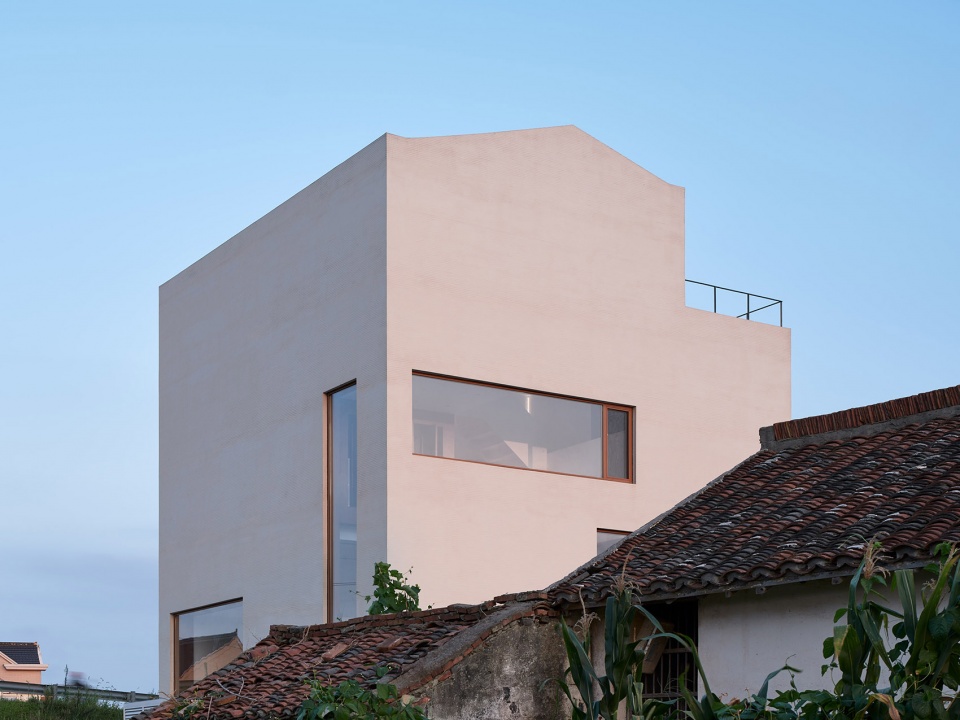
▼露台看日落,Watch the sunset on the terrace © 朱清言
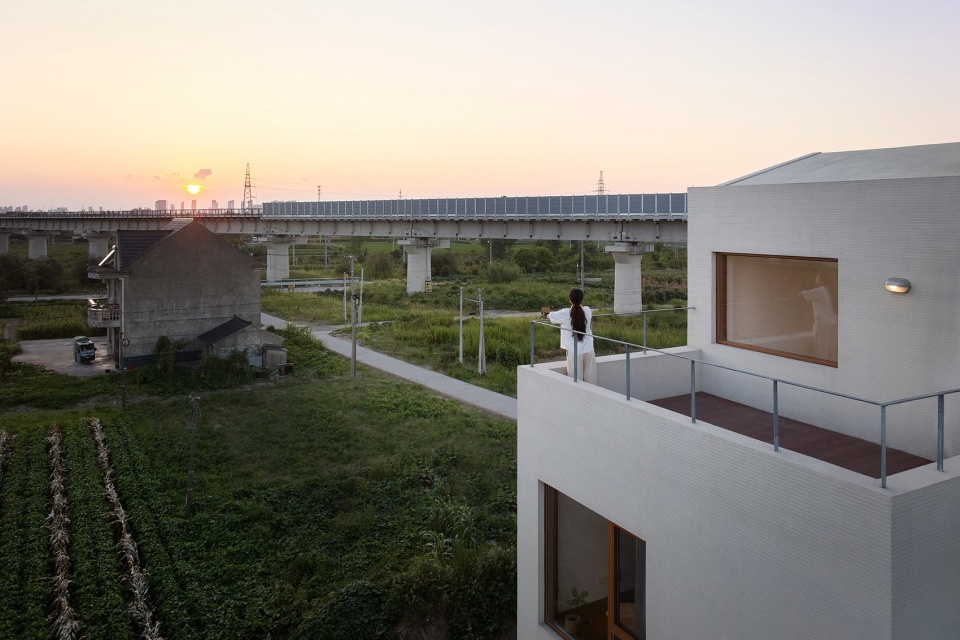
尽管彭宅从外观视觉上仅2层半,但内部通过错层设计,翻新后的彭宅实际有4层。设计将彭先生的书房,孩子卧室与书房,主卧与妻子书房等分设不同层,保证每个家庭成员的私密与独立。我们在每一层都设有书房,使80后小家庭的所有人都有独立的工作、阅读、娱乐空间。随着时代变迁,在城市生活方式的影响下,私人空间在家庭中的重要性日益凸显。相对于全家挤在一起看电视,人们开始更愿意在自己的空间里使用电子设备,去阅读或观看自己更感兴趣的内容。
▼上下四层的错层,Staggered floors on four levels ©立木
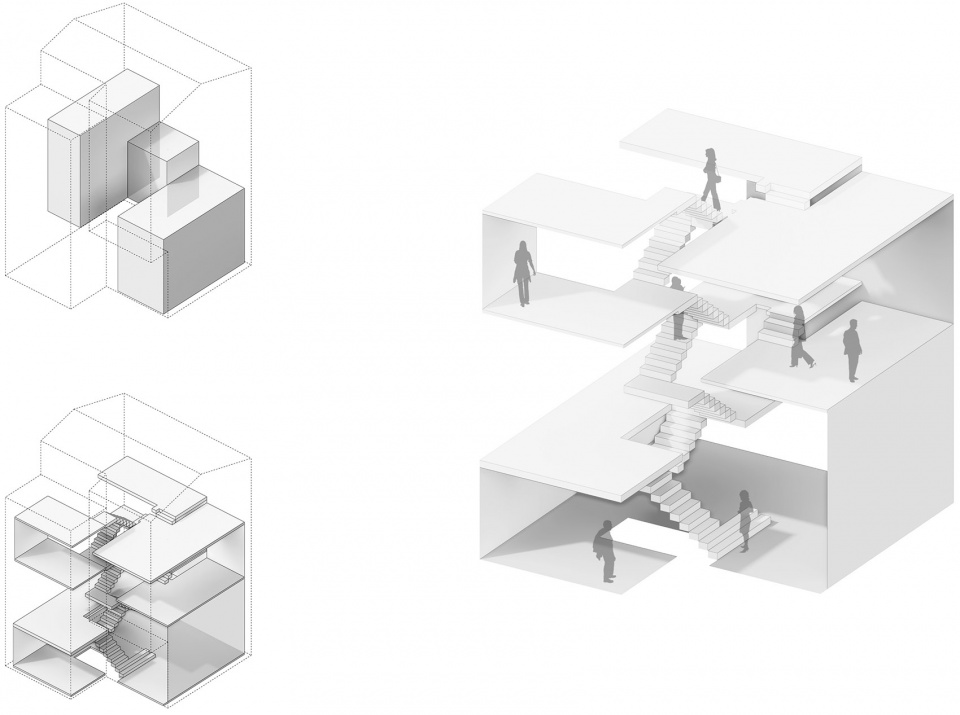
Although Peng’s house is only 2.5 floors visually, the interior of the renovated Peng’s house actually has 4 floors through the staggered design. The design separates Mr. Pang’s study room, the children’s bedroom and study room, the master bedroom and his wife’s study room into different levels to ensure the privacy and independence of each family member. We have a study room on each floor so that all members of the small post-80s family have independent space for work, reading and entertainment. As times change and under the influence of urban lifestyles, the importance of private space in the family is becoming more and more prominent. People are beginning to prefer to use electronic devices in their own space to read or watch what they are more interested in, as opposed to the whole family huddling together to watch TV.
▼上中庭,Upper courtyard © 朱清言
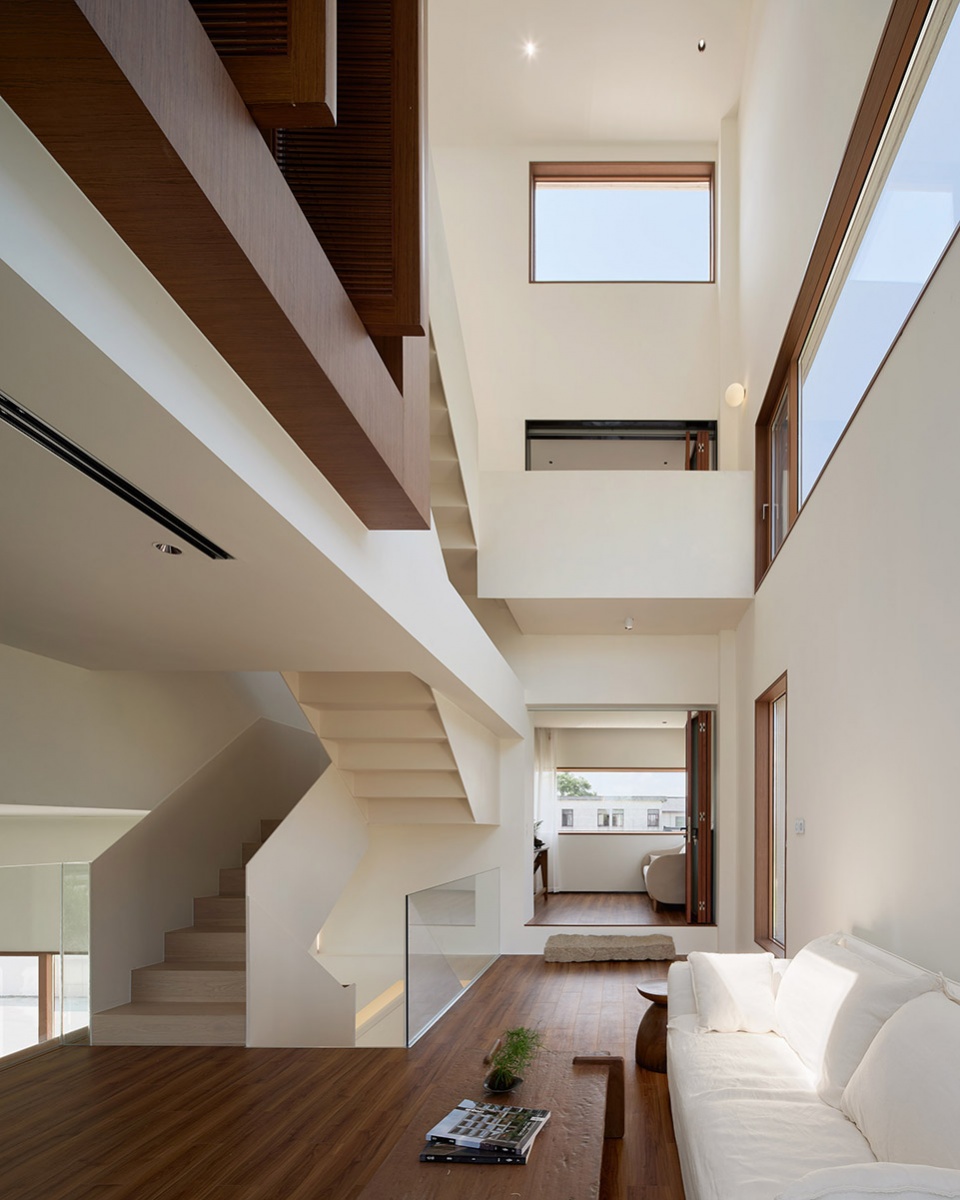
▼竖向长窗,Vertical window © 朱清言
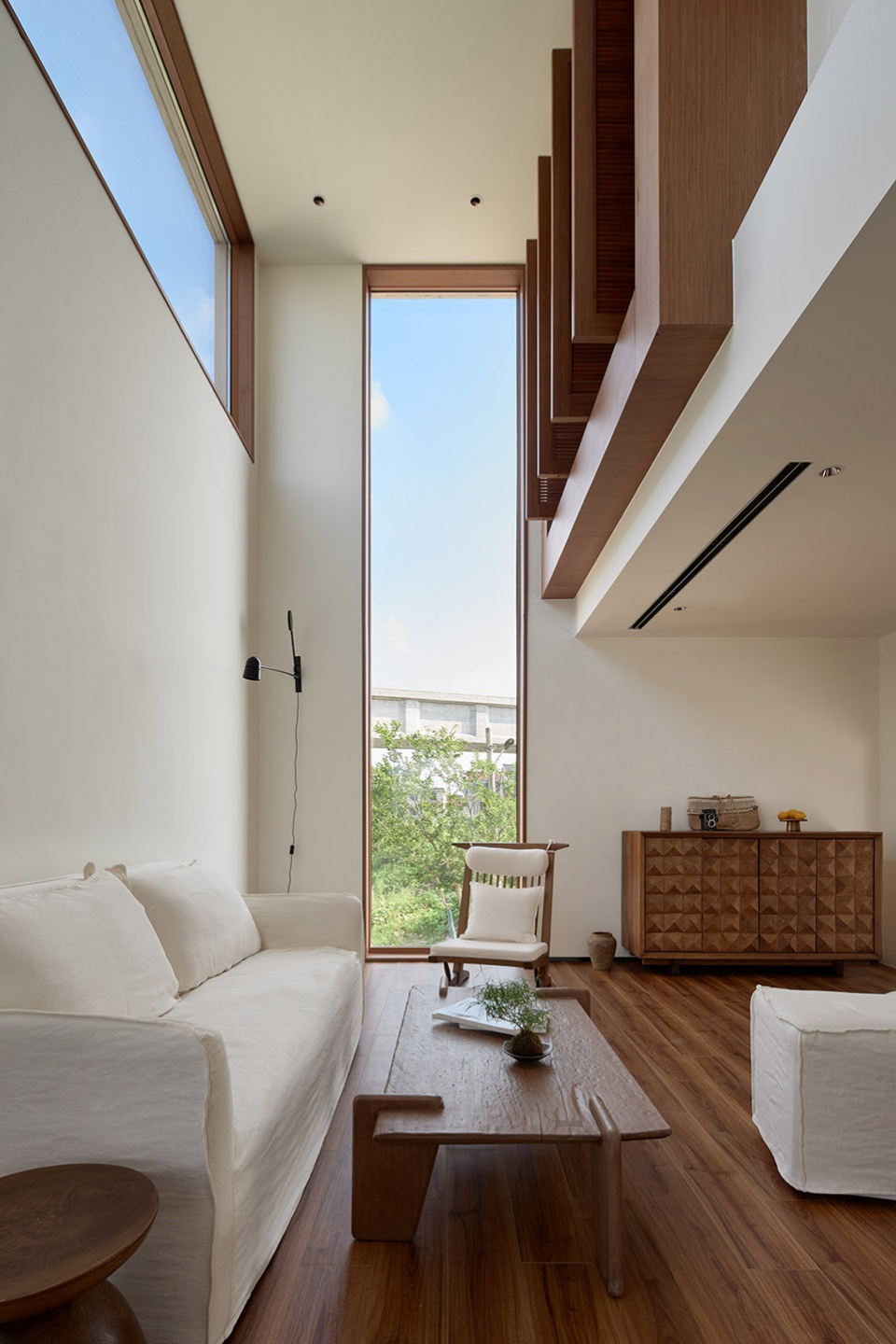
但我们依然在二层以上的空间里,预留了丰富的看与被看的关系。相对于一层的完全敞开,二层以上的互动则更加暧昧,通过一系列连续的通高彼此联系。“退休”之后的彭先生一家以炒股为主业,通高在空间图形上如同股票连续涨停的曲线,使新彭宅成为朋友们口中的“涨停之家”。“涨停”通高作为住宅风水的另类演绎,也会给这一家人带来更多的吉祥与好运。
But we still reserve a rich relationship between seeing and being seen in the space above the second floor. In contrast to the complete openness of the first floor, the interactions above the second floor are more ambiguous, connected to each other through a series of successive passages. “Mr. Peng’s family is mainly engaged in stock speculation after retirement, and the spatial pattern of the through-highs is like the curve of a stock’s continuous upward movement, which makes the new Peng Residence a “upward movement house” according to his friends. As an alternative interpretation of feng shui, the “stopping” will also bring more luck and good fortune to the family.
▼二层起居室,Living room on the second floor © 朱清言
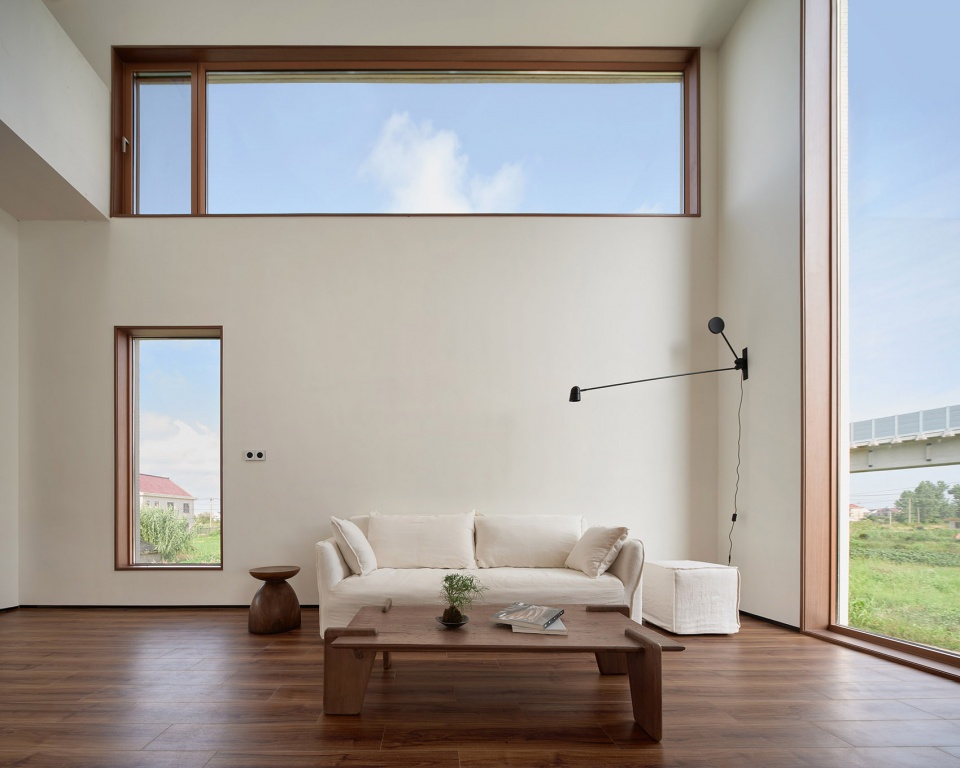
▼三层书房望向起居室,Third floor study room looking into the living room © 朱清言
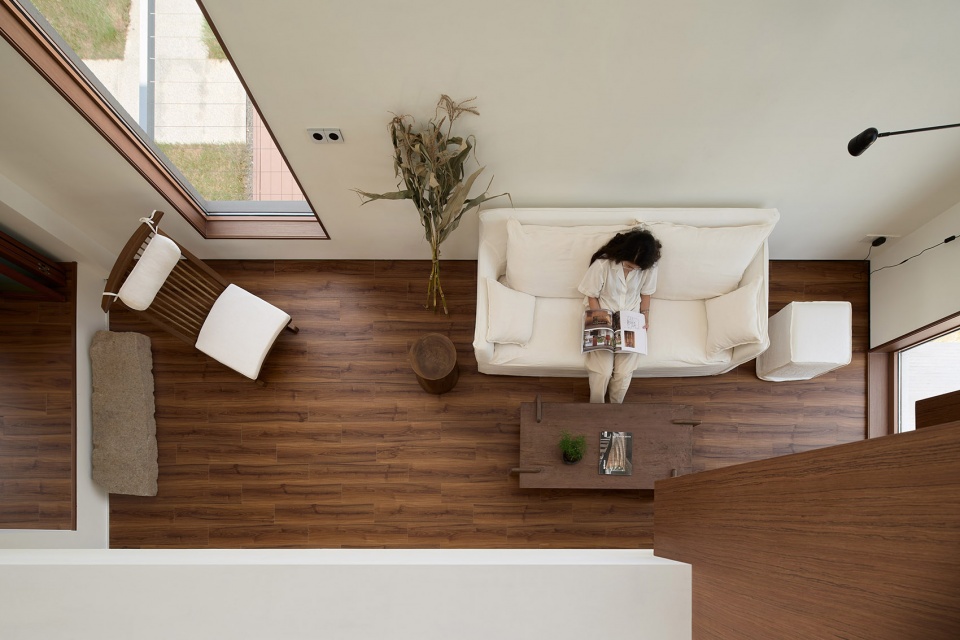
▼高窗的光影流动,Interior detailed view © 陈子茜
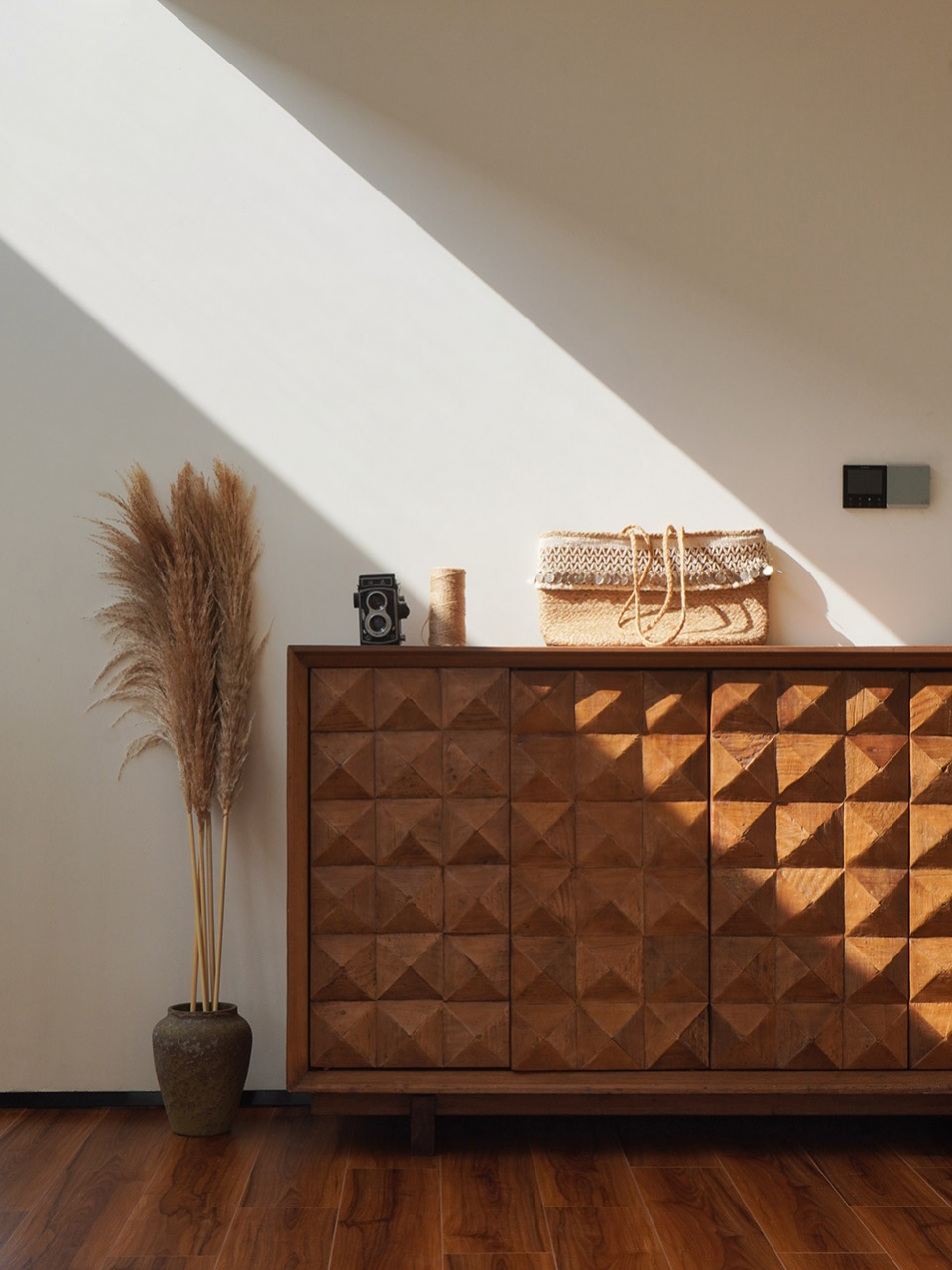
我们将这个住宅命名为Crossing House,就像它在鸟瞰图中所呈现的,一个位于交叉口的房子。回不去的乡村与无法告别的城市,我们正处在这样的交叉口,而这个房子的内部也是一个交叉口,通向两种全然不同的生活方式。
We named this house Crossing House, as it appears in the aerial view, a house located at the intersection. We are at such a crossroads between the village that cannot go back and the city that cannot be bid farewell to, and the interior of this house is also a crossroad, leading to two completely different ways of life.
▼天窗,Skylight © 朱清言
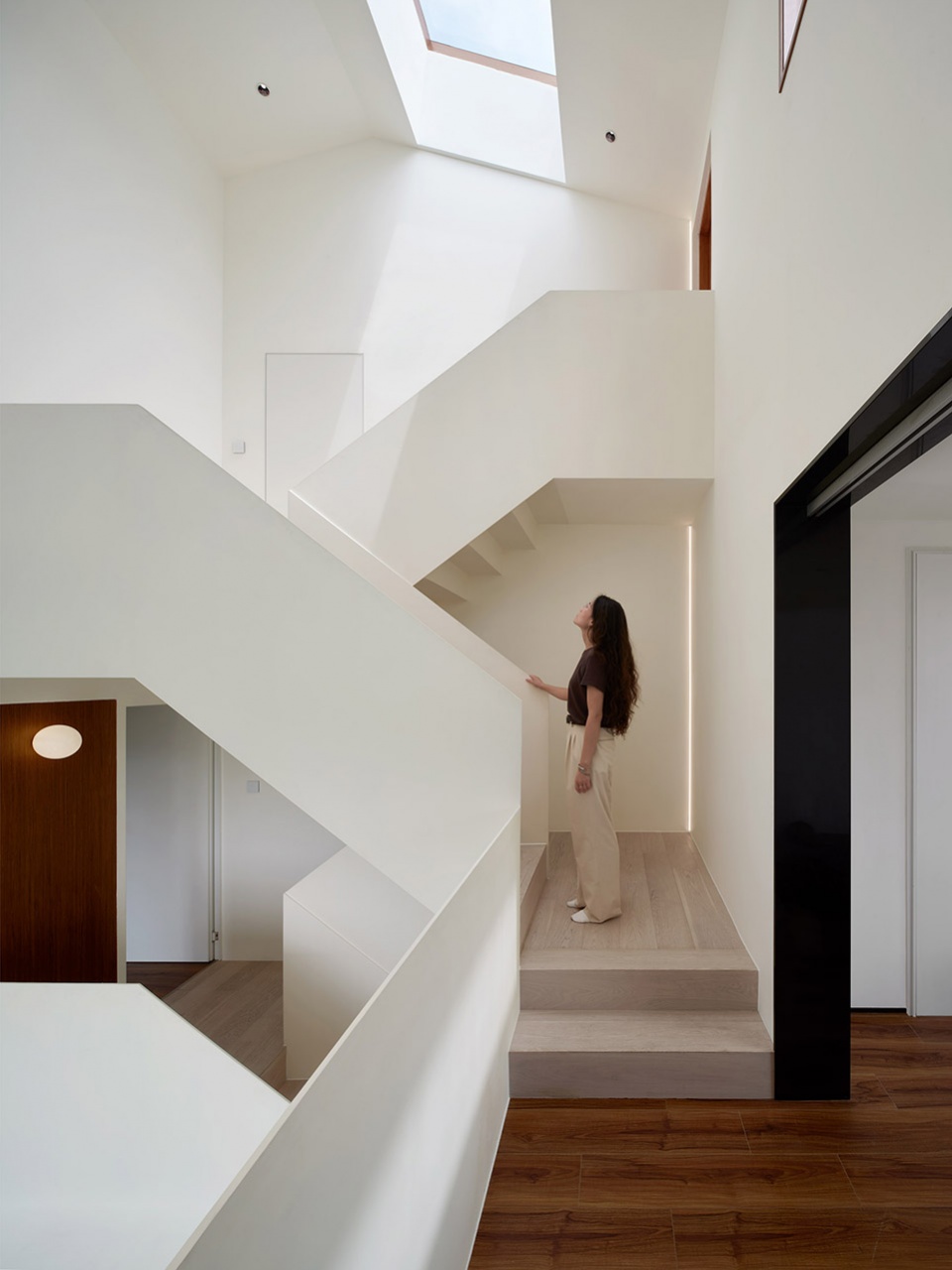
▼楼梯上的光影流转,The flow of light and shadow on the stairs © 朱清言
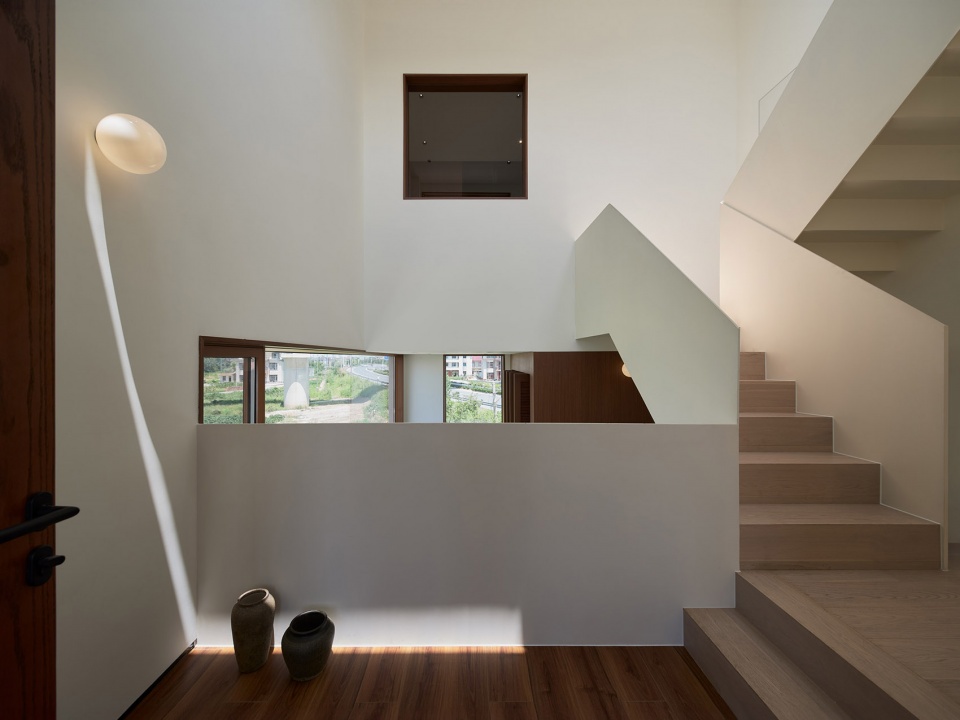
建筑南侧三层四层以两个相互咬合并错动退让的阳台形成立面上“crossing”的关系,三层儿童房的内阳台和四层主卧的露台呈对角线设置,与同样呈对角设置的三层客卧和四层主卧的方形玻璃窗构成了“X”,这种在垂直方向的纵深变化使得不同房间的风景变得富有层次,是一种“纷至沓来”的诗意,消解了水平、垂直、斜向与内外空间的边界,也消除了过极小基底面积下“火柴盒”轮廓带来的敦实感。
On the south side of the building, the third and fourth floors form a crossing relationship on the facade with two staggered balconies. The inner balcony of the third floor children’s room and the terrace of the fourth floor master bedroom are arranged diagonally, forming an “X” with the square glass windows of the third floor guest bedroom and the fourth floor master bedroom, which are also arranged diagonally. This vertical depth change makes the scenery of different rooms rich in layers, which is a poetic feeling of space. It eliminates the boundaries between horizontal, vertical, oblique, and internal and external spaces, as well as the sense of solidity brought by the matchbox contour under extremely small site area.
▼四层主卧,Fourth floor master bedroom © 朱清言
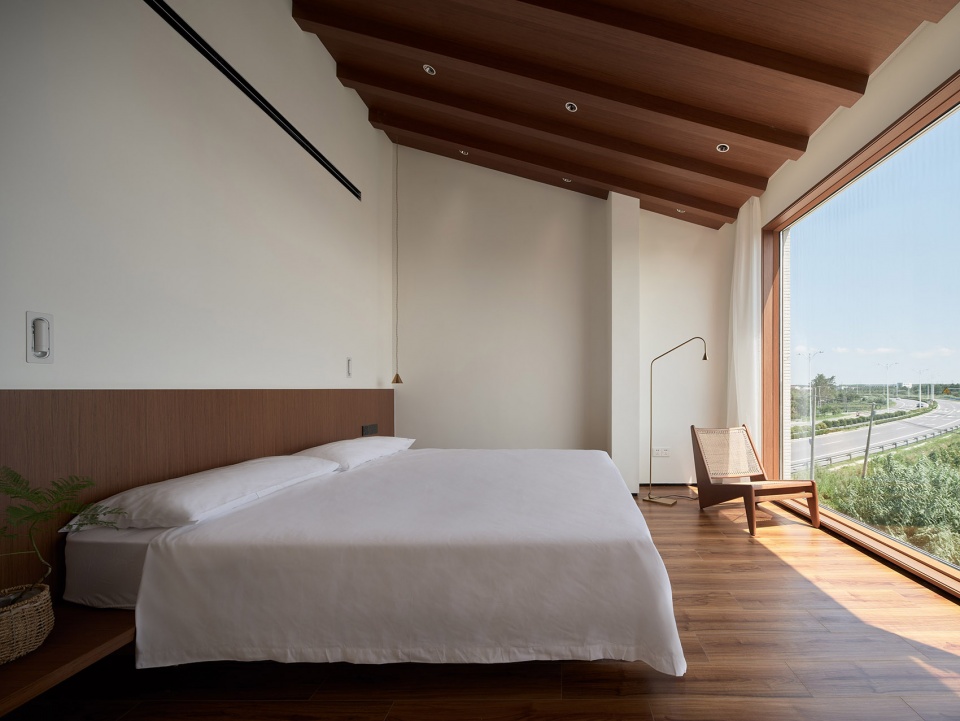
▼主卧的风景,View from the master bedroom © 朱清言
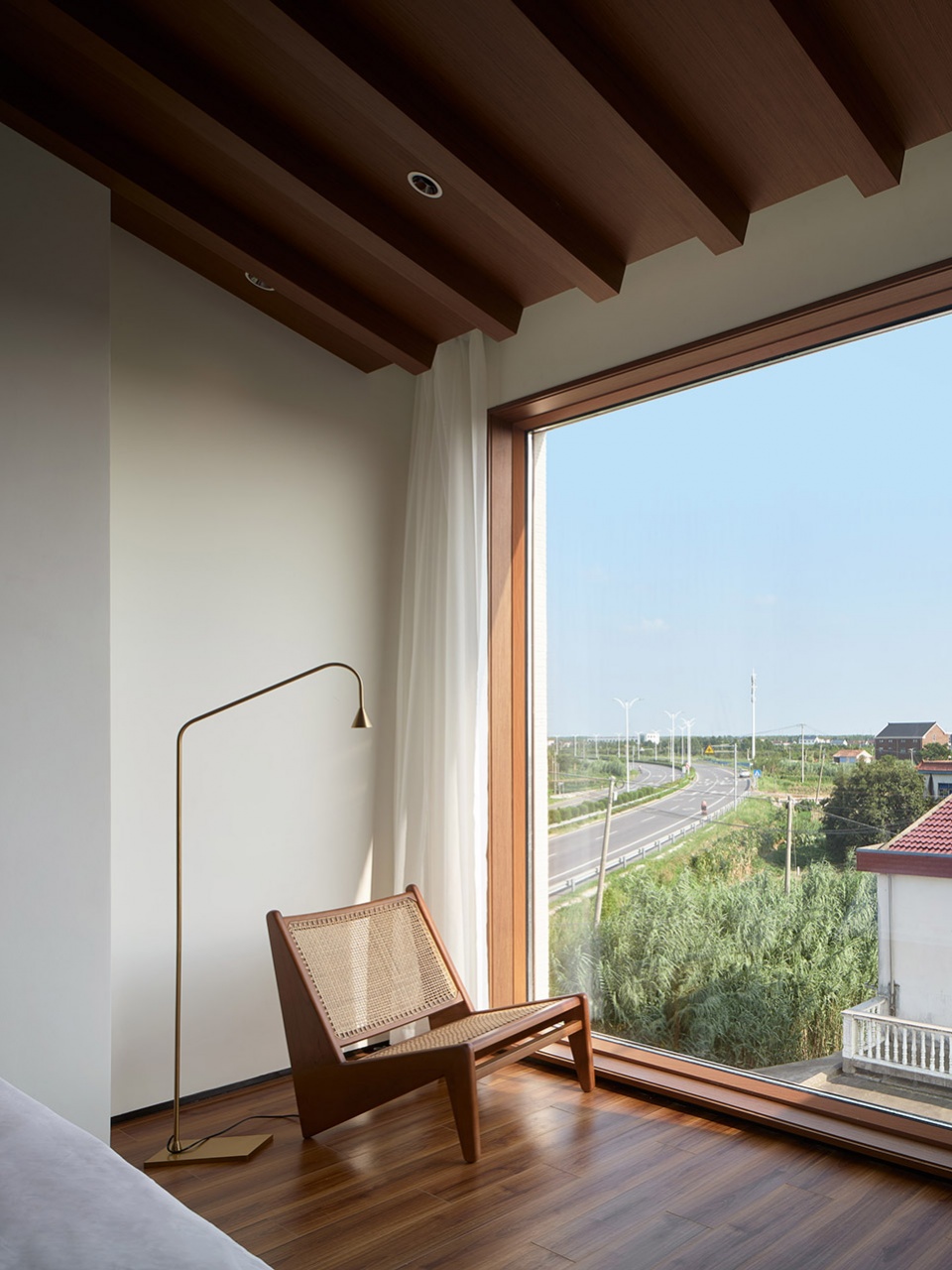
建筑它以坚实和脱离的背影与象征速度与陌生的城市告别,而用柔软与开放的面庞朝向日渐衰老与凋零的村庄。南侧二层书房设置转角玻璃窗,延伸到西侧,间之以似窗似门的透明洞口,紧接着便是三层高度上的横向长窗。西侧洞口横竖的几何变化削弱了山墙实面的厚重感,也为三层儿童房的书房提供了内化的风景。北侧唯一的两个洞口正是一层客厅和二层起居室的通高,建筑内部空间关系以最直白的几何语汇反映在立面,也是对室外朴树景观的借景。
▼窗洞分析,Window Analysis ©立木
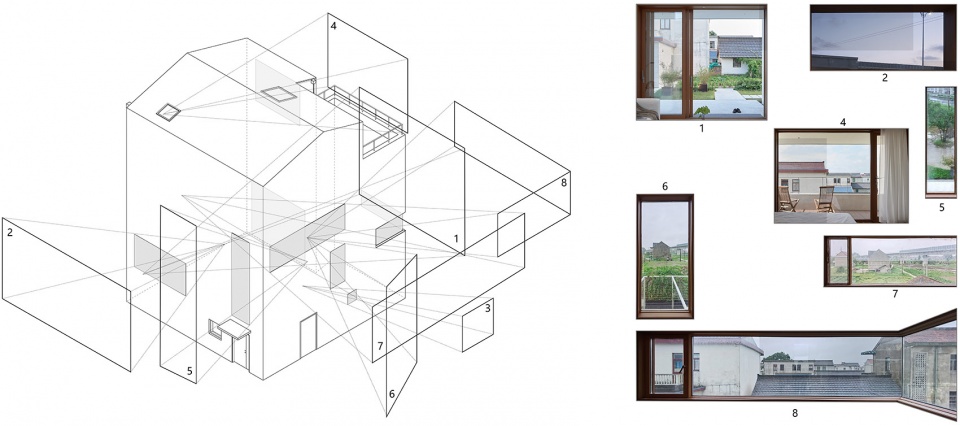
The building bid farewell to the unfamiliar city with its solid and detached back, while facing the aging and withering village with its soft and open face. The study on the second floor on the south side has corner glass windows that extend to the west, with transparent openings resembling windows and doors, followed by horizontal long windows on the third floor height. The geometric changes in the horizontal and vertical directions of the western side weaken the sense of thickness on the gable wall, and also provide an internalized view for the study of the three story children’s room. The only two openings on the north side are the windows of the first floor living room and the second floor living room. The internal spatial relationship of the building is reflected straightforward on the facade, which is also a borrowing of the outdoor landscape.
▼二层书房与转角窗,Second floor study room with a corner window © 朱清言
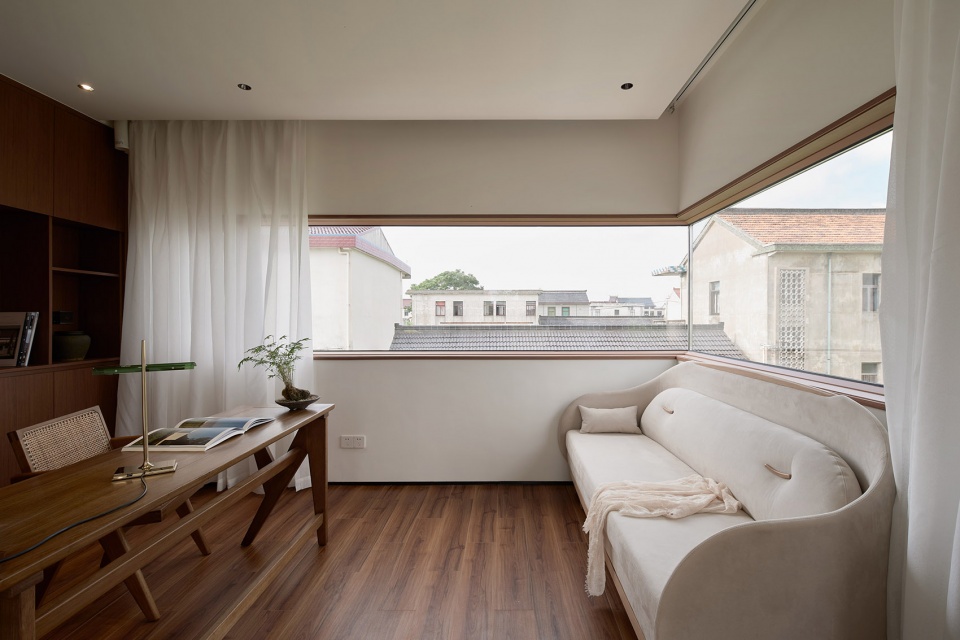
▼二层半的窗口,Window at the two and a half floor © 朱清言
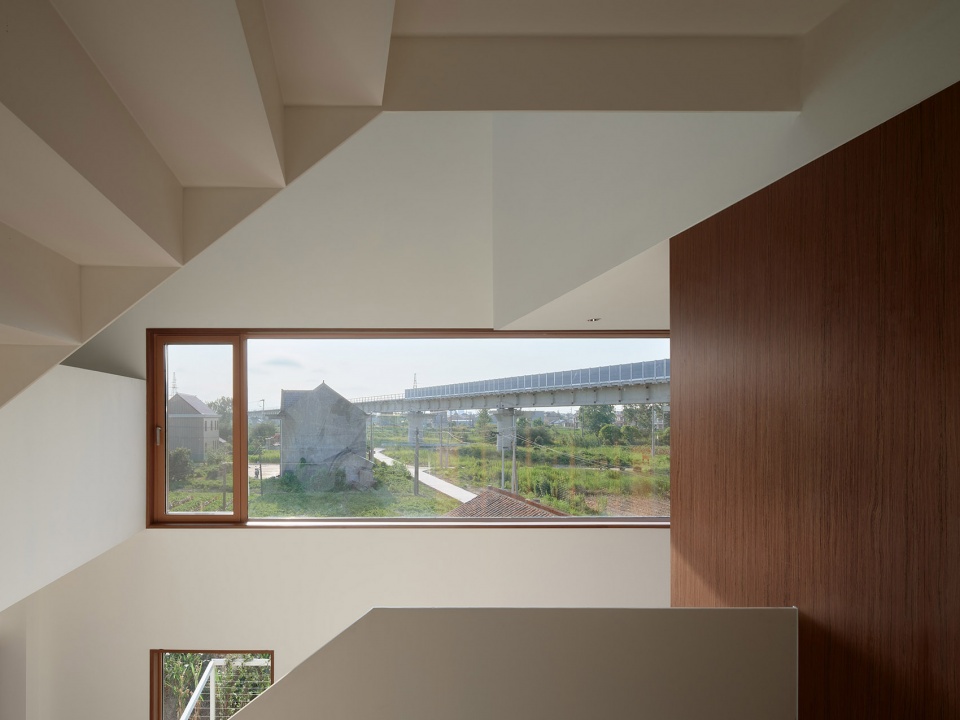
▼左:四层书房与露台对望,右:四层书房与衣帽间,Left: Fourth floor study looking out onto the terrace; Right: study and checkroom © 朱清言
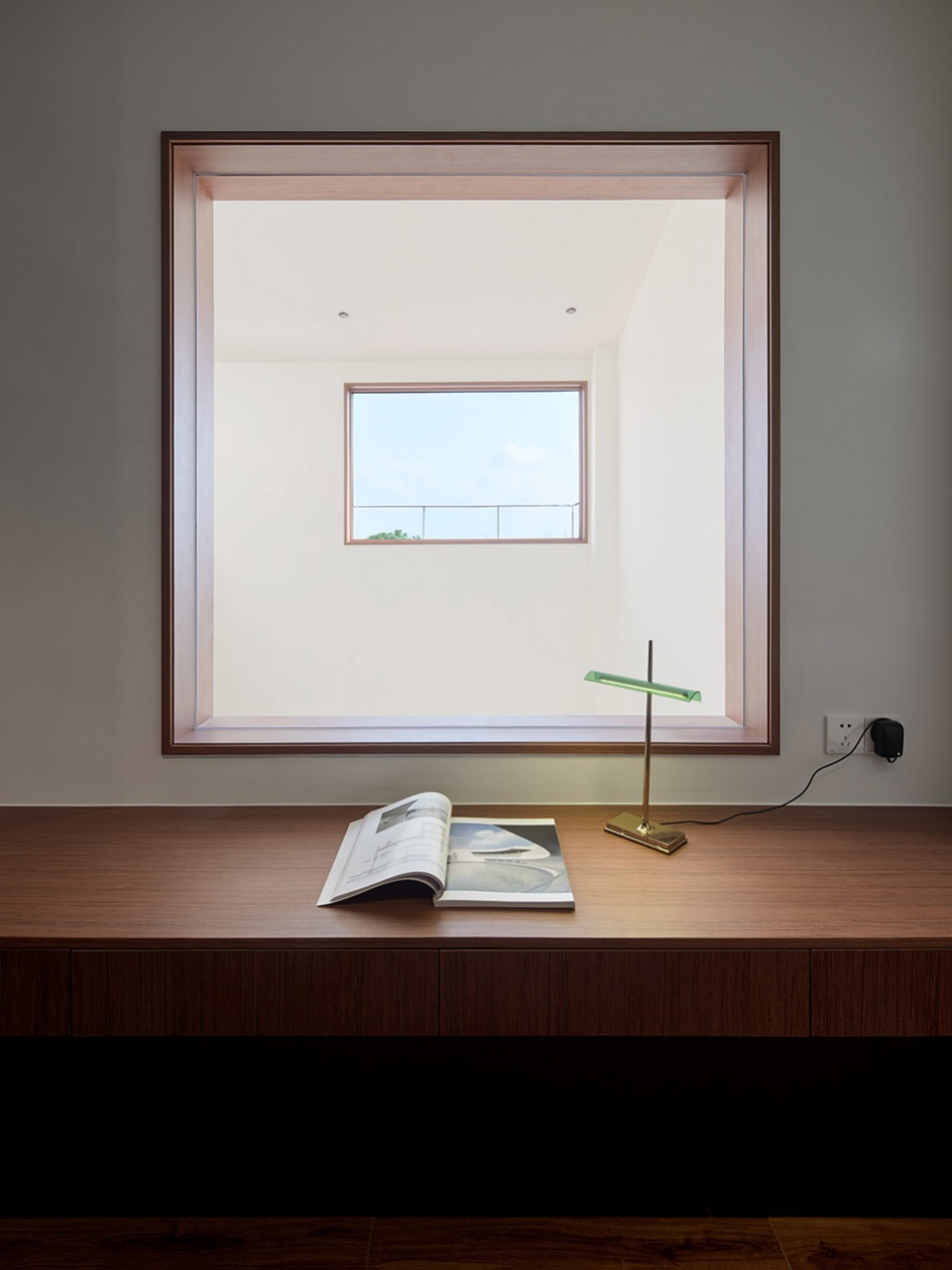
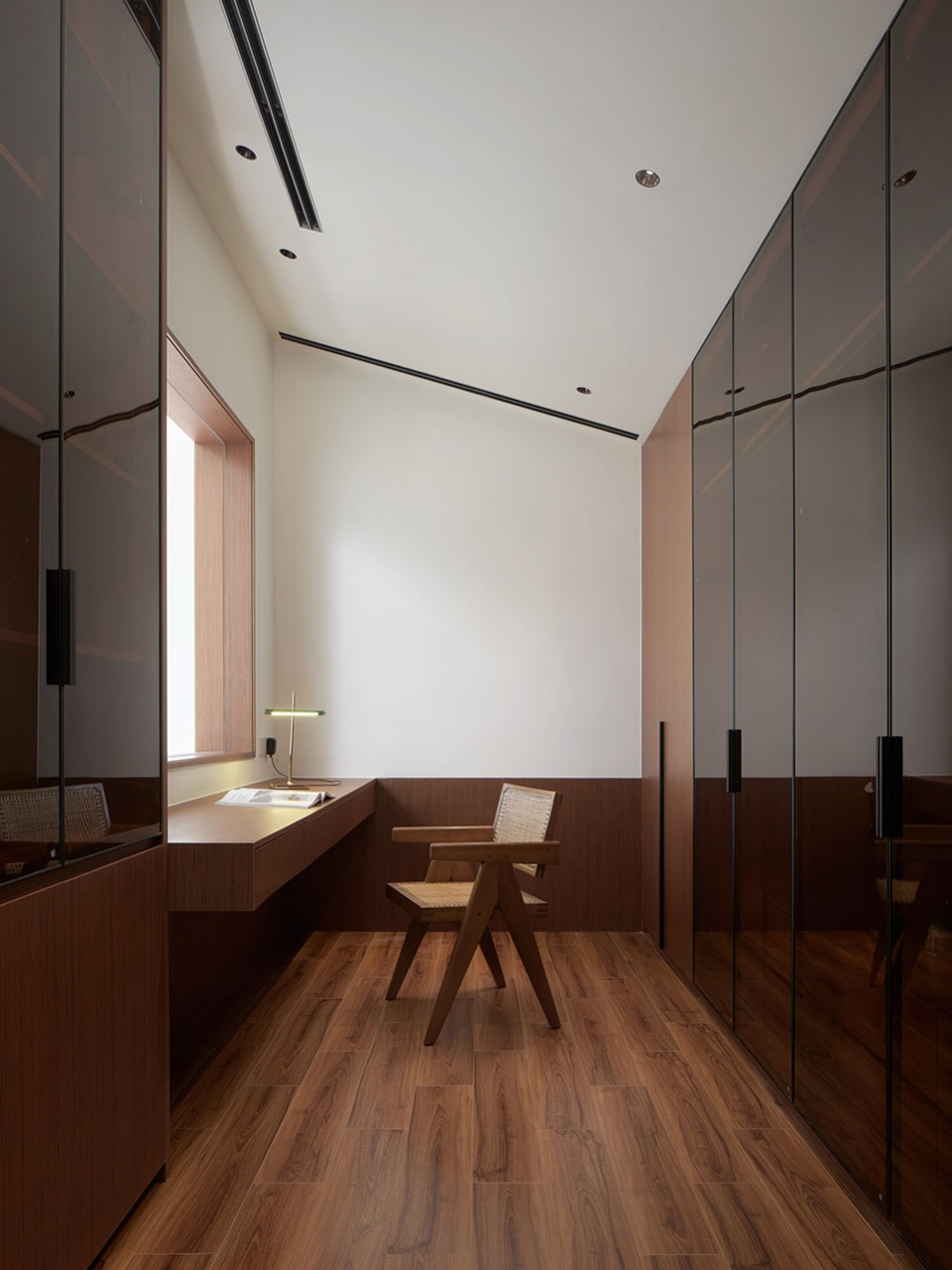
新彭宅的设计是乡村与城市生活方式的异质混合,大家庭与小家庭,两代父母与子女的生活网络在此交织,最终调和成简洁理性的建筑整体空间。随着时代的飞速发展,人去人归,50后、80后与10后各自的生活方式也都在发生变化,唯一不变的是变化本身。
The design of New Peng’s House is a heterogeneous mix of rural and urban lifestyles, where the networks of large and small families, two generations of parents and children are intertwined, and ultimately harmonized into a simple and rational architectural space. With the rapid development of the times, people are leaving and returning, and the lifestyles of the Post-50s, Post-80s and Post-10s are all changing, and the only thing that remains unchanged is the change itself.
▼静默地伫立在这片土地上,Standing silently in the land © 朱清言
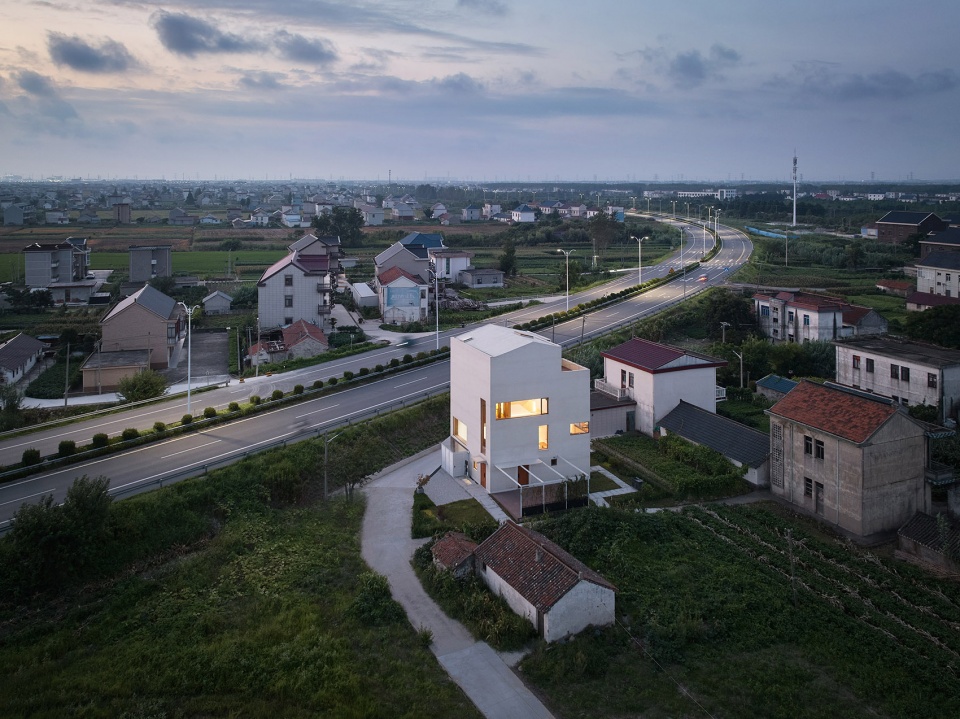
鸟瞰启东彭宅,它的身姿既融入又超脱,犹如一位乡土社会变迁的记录者,静默地伫立在这片土地上。
A bird’s-eye view of Qidong Peng’s House, its stance is both integrated and transcendent, like a recorder of the changes in the vernacular society, standing silently in this land.
▼总平面图,Site plan © 立木
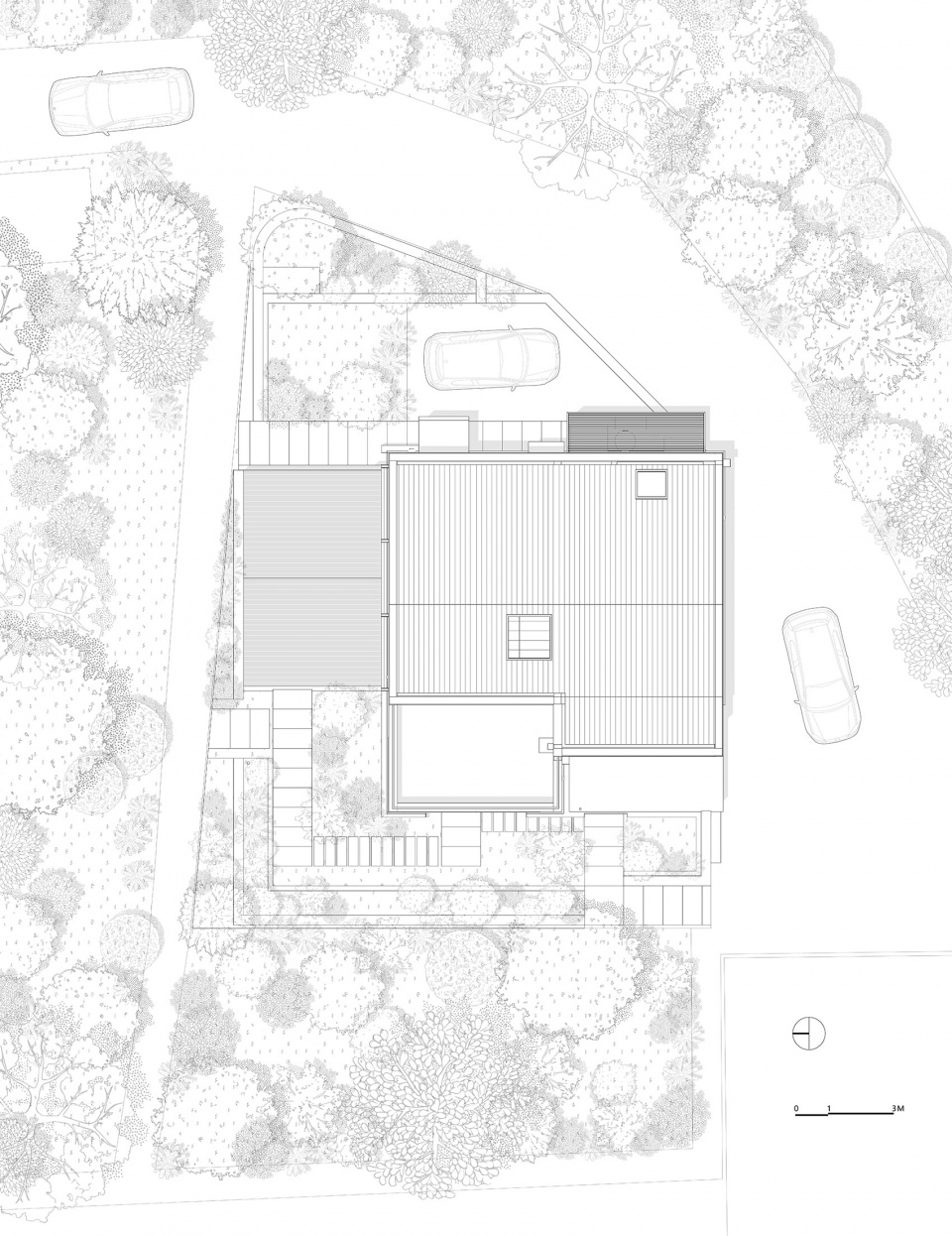
▼一层平面图,Plan 1F © 立木
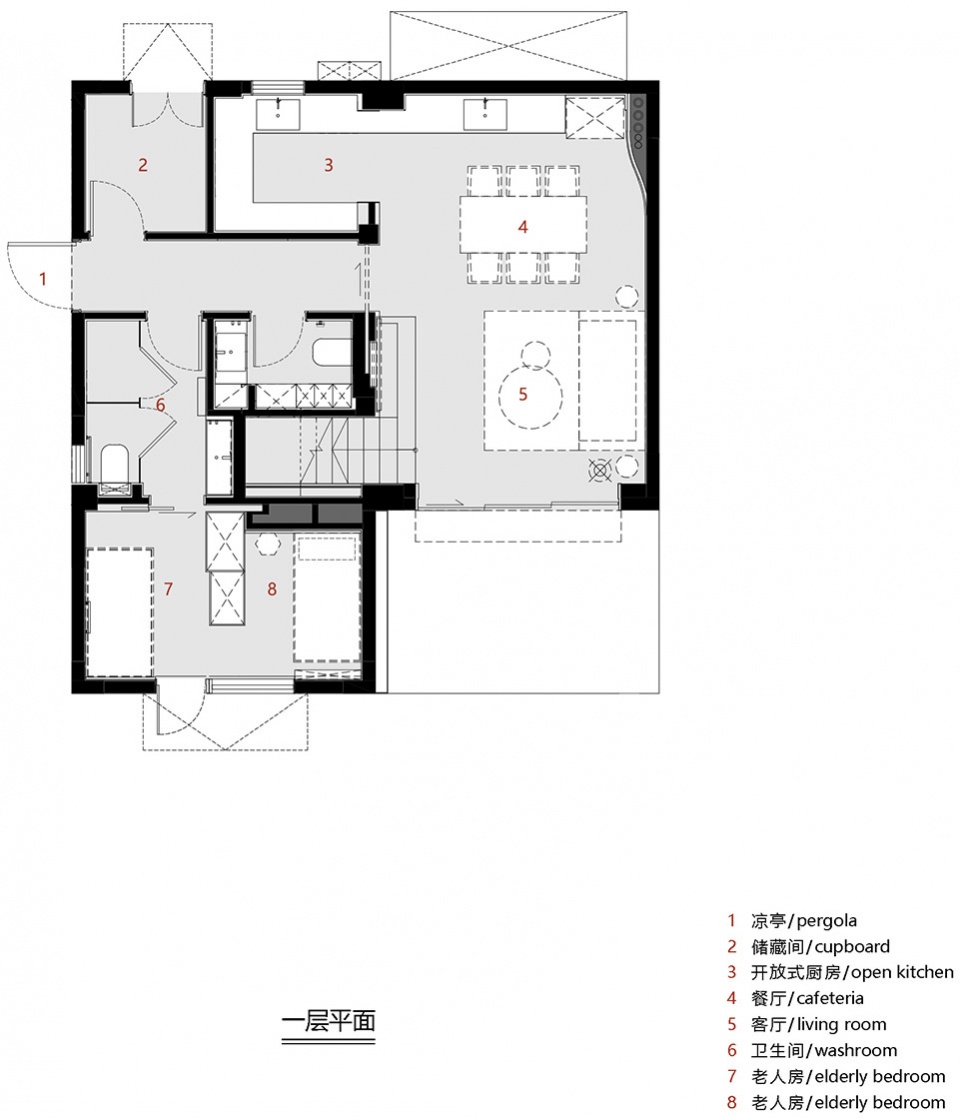
▼二层平面图,Plan 2F © 立木
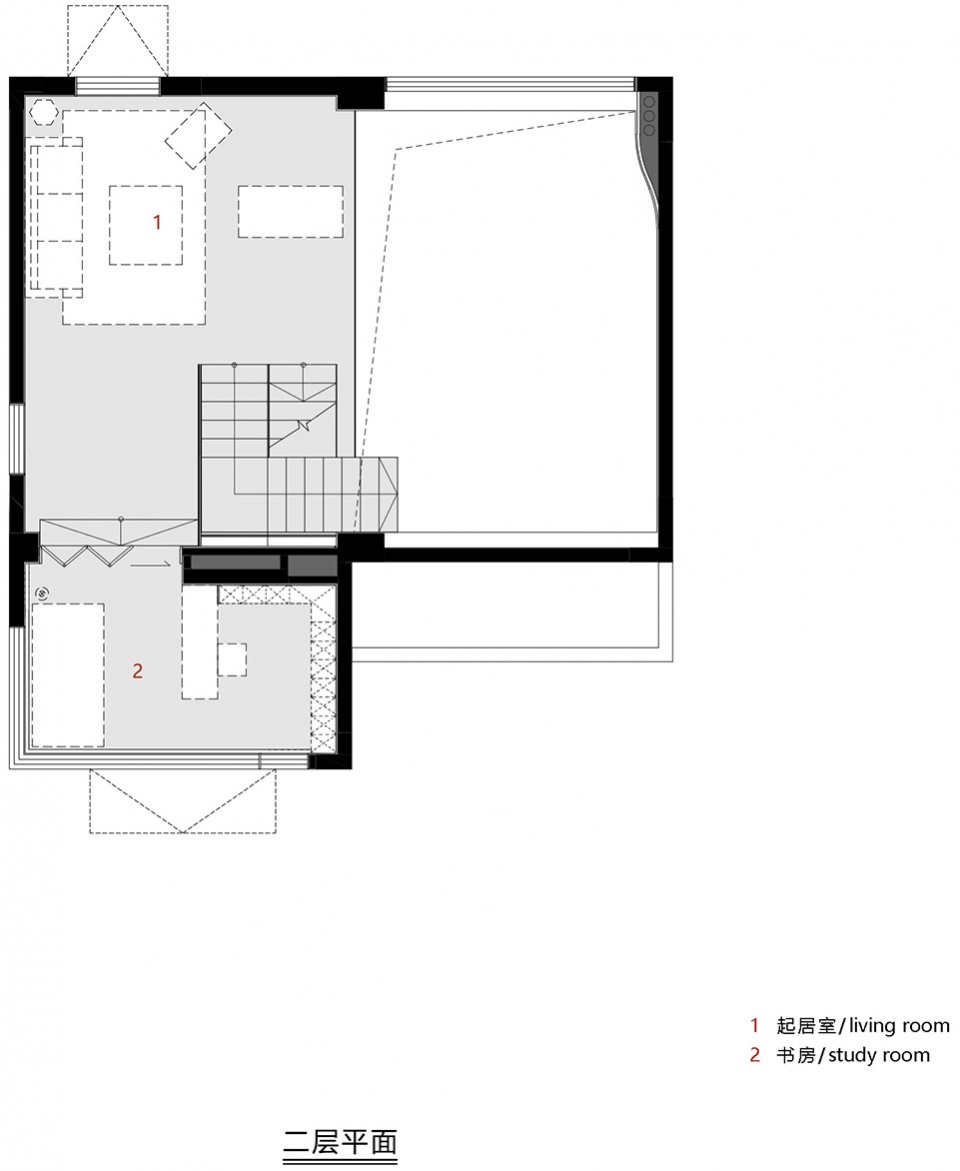
▼三层平面图,Plan 3F © 立木
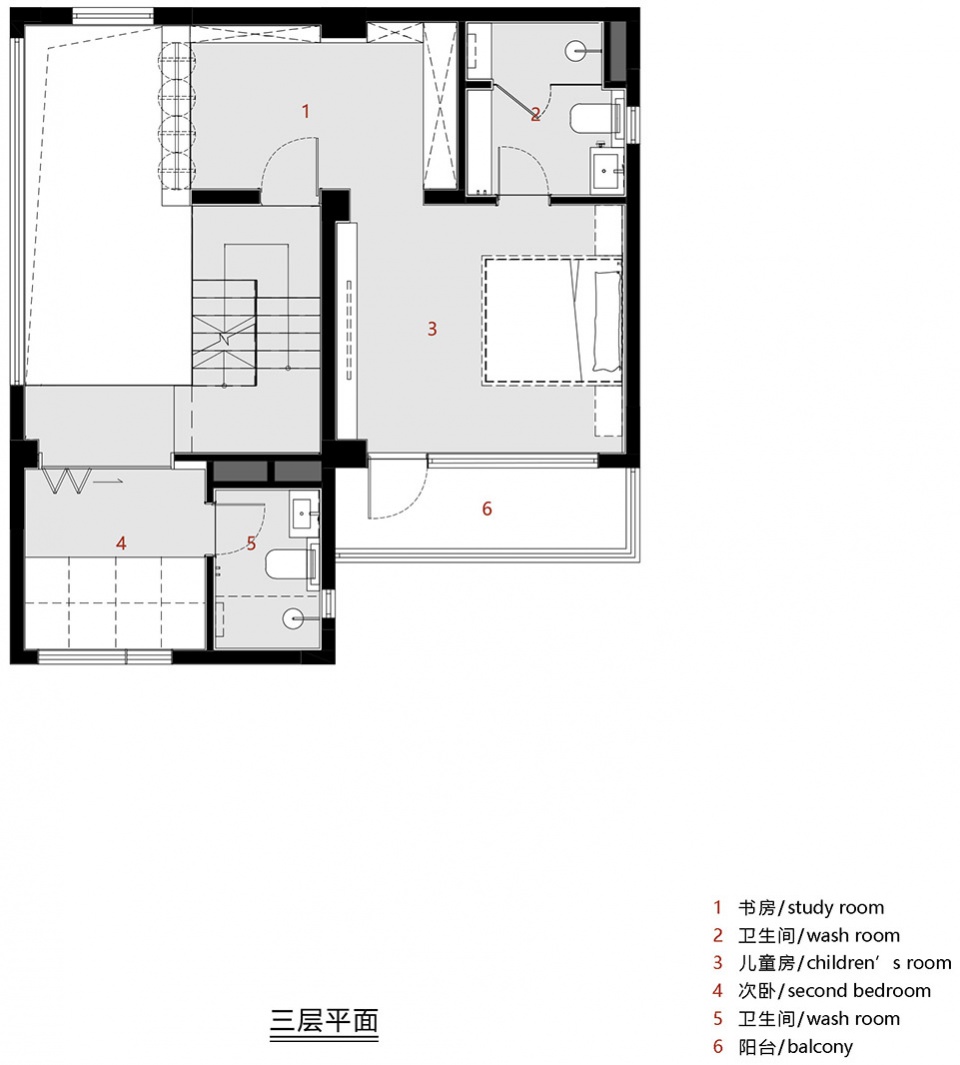
▼四层平面图,Plan 4F © 立木
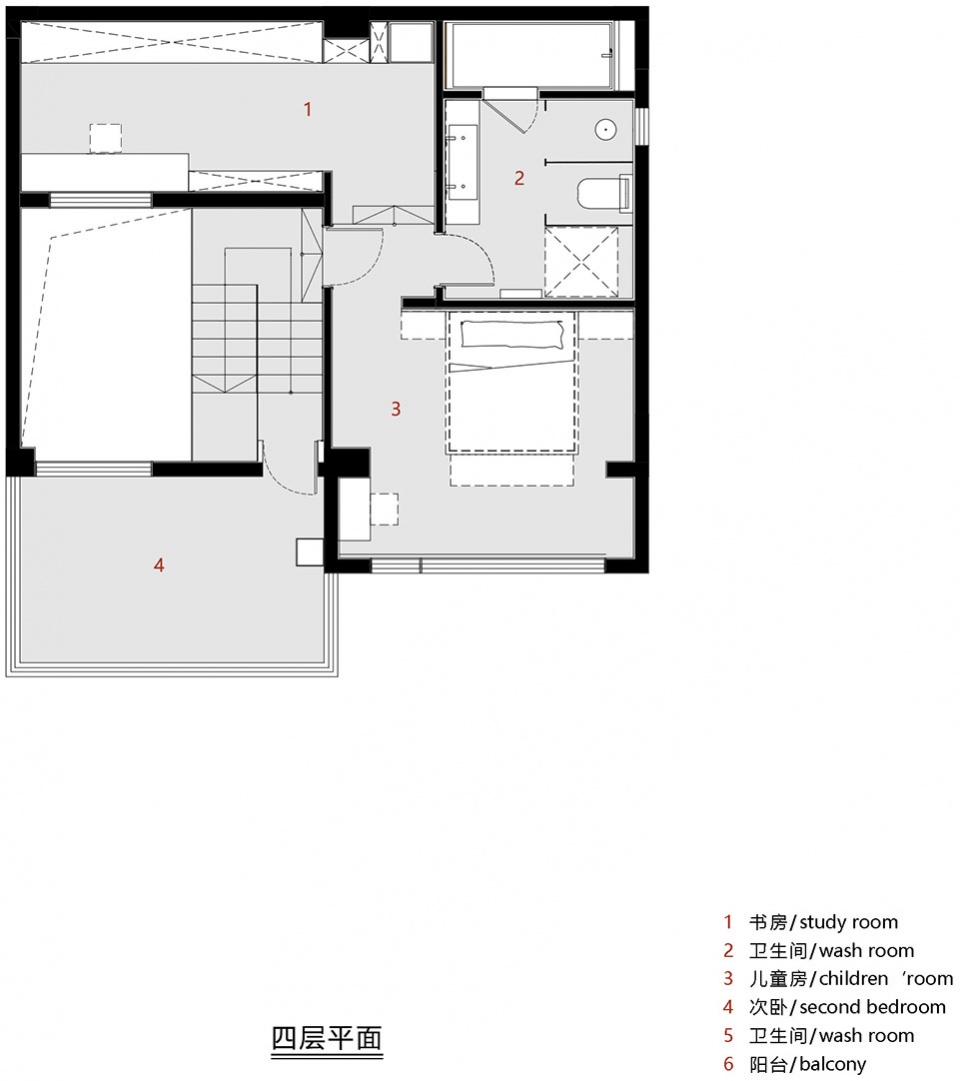
▼南立面图,South elevation © 立木
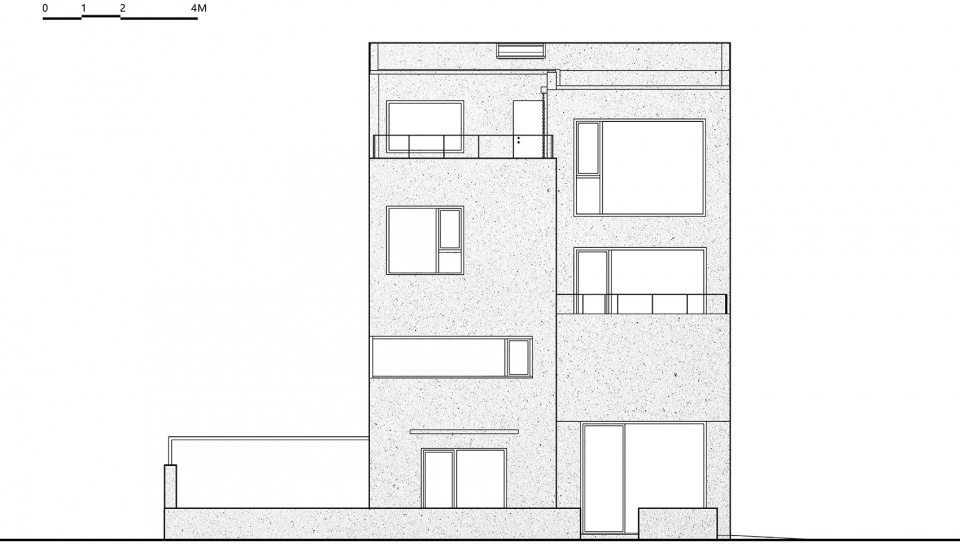
▼北立面图,North elevation © 立木
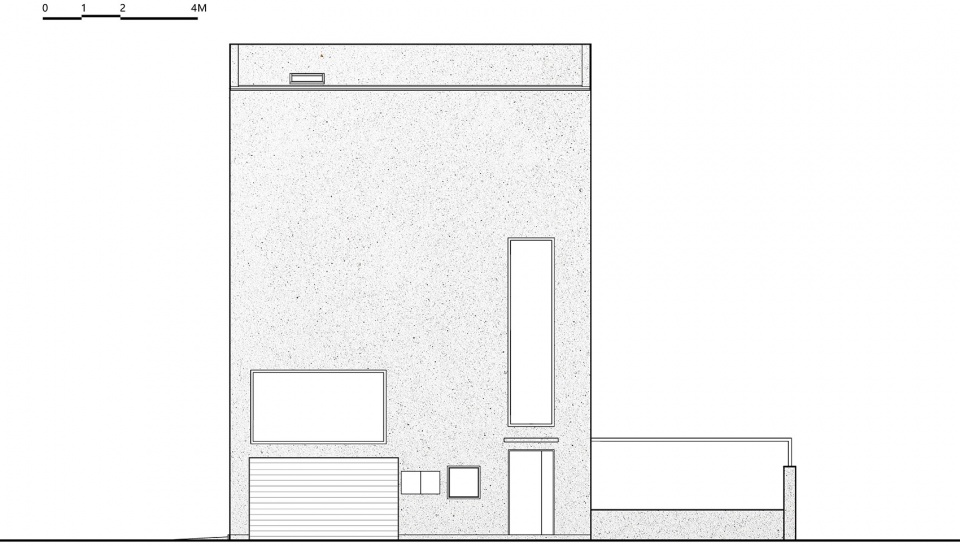
▼西立面图,West elevation © 立木
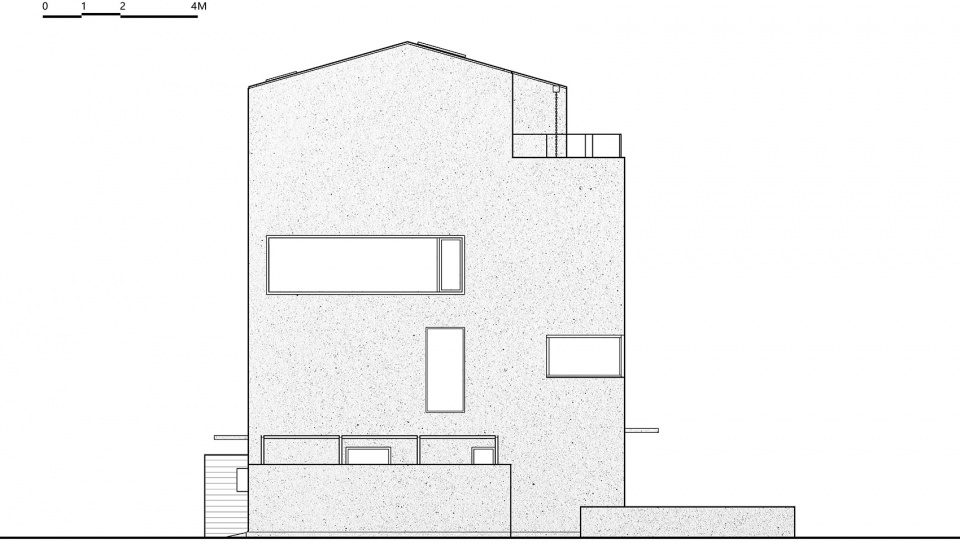
▼东立面图,East elevation © 立木
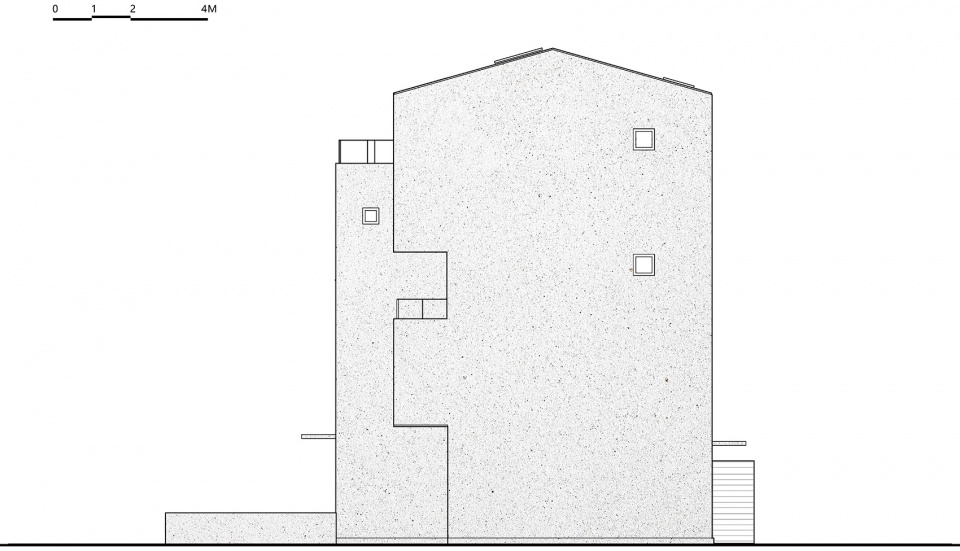
项目名称: 启东彭宅,80后和50后的“退休”之家
项目完成年份: 2023年
建筑面积: 250㎡
设计单位:立木 L&M
公司所在地:上海市长宁区定西路
小红书账号(如有):guolan1990
项目地址: 江苏南通启东市
材料:质感涂料/水磨石/木饰面
品牌:立邦/朵颐/戴尼森
项目参与者
主创建筑师: 刘津瑞、邹明溪
设计团队: 李佳妍、李春瑶、郇雨、程苗、谢舜冰、刘明昊、管浩廷、肖罗琴、陈子茜、邹承幸、许凤洁、王刘阳
室内施工图设计:一卜川
室内施工图设计团队:小冲哥、辛林凯,王运发,王德升,万育伊
项目驻场:李翔、郇雨
设计顾问:申鹏
结构顾问:唐熙、刘承亮
暖通顾问:芮文
摄影师: 朱清言










